Hexagramme 28 du Yi Jing
L'hexagramme : 28
Un hexagramme est une combinaison de six traits yin et yang.

28 - THE TÂ KWO HEXAGRAM.
Tâ Kwo suggests to us a beam that is weak. There will be advantage in moving (under its conditions) in any direction whatever ; there will be success.
Bing DeepL Google Yandex28 - Loneliness
One goes on their own if necessary. Stick to the essential.
Bing DeepL Google Yandex28 - Loneliness
One goes on their own if necessary. Stick to the essential.
Bing DeepL Google Yandex28 - Tá kvoh, le grand excès
Tá kvoh : 1. Grand excès, défaut, manquement ; 2. Traverser, dépasser.
Texte
Grandeur défectueuse. Appui faible qui, en s’affermissant en toute manière, peut devenir utile. (Un défaut peut se réparer.)
Symbolisme
Marais couvrant des arbres. Le sage, devant un pouvoir vicieux, se tient seul sans crainte et fuit le monde sans regrets.
Commentaire
Grandeur défectueuse, colonne faible dont le haut et le bas le sont aussi. La force défectueuse au milieu de gens faibles et doux peut, si elle agit en cherchant à satisfaire, s’affermir et prospérer en tout. La grandeur excessive ou défectueuse est une chose funeste.
Note. Nous avons ici une collection d’expressions proverbiales dont plusieurs se rapportent à la forme même du Koua. Celui-ci peut, en effet, à la rigueur, figurer une poutre entamée en haut et en bas, donc très défectueuse.
On voit ici une fois de plus combien ces divisions en six parties sont arbitraires. Le § 3 n’est que la répétition du texte ; les §§ 2 et 5 se confondent.
Les trigrammes
Les trigrammes sont des combinaisons de trois traits yin et yang. Dans l'hexagramme, les trois traits du dessous constituent le trigramme inférieur et représentent la situation intérieure. Les trois lignes du haut constituent le trigramme supérieur et représentent la situation extérieure.
Trigramme supérieur : Le lac

Trigramme inférieur : Le vent

Commentaires des traits
The lines represent the evolution of the hexagram, from the bottom (young) to the top (old).
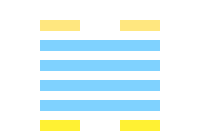
28.1 (28 > 43) - THE TÂ KWO HEXAGRAM.
The first line, divided, shows one placing mats of the white mâo grass under things set on the ground. There will be no error.
Bing DeepL Google Yandex28.1 (28 > 43) - Reinforcing supports
One wants to improve because of the weakness.
Bing DeepL Google Yandex28.1 (28 > 43) - Strengthening supports
One wants to improve because of the weakness.
Bing DeepL Google Yandex28.1 (28 > 43) - Tá kvoh, le grand excès
Tá kvoh : 1. Grand excès, défaut, manquement ; 2. Traverser, dépasser.
Ceci est susceptible de deux explications : a. « S’appuyer sur des joncs » est un grand défaut ; ils plient et ne soutiennent pas. b. Pour placer un objet comme natte à offrande, se servir de mao blanc est fautif.
Note. Au lieu de gratter simplement la terre et l’aplanir.
(Le mao blanc représente la pureté, la droiture, kiet tche. Ceci d’après le commentaire représente un excès de précaution. Kwéh hu weï shin (1er sens).
28.1 (28 > 43) - Renforcer les soutiens
On veut améliorer à cause de la faiblesse.
Bing DeepL Google Yandex
28.2 (28 > 31) - THE TÂ KWO HEXAGRAM.
The second line, undivided, shows a decayed willow producing shoots, or an old husband in possession of his young wife. There will be advantage in every way.
Bing DeepL Google Yandex28.2 (28 > 31) - Nurturing hope
When one encounters difficulties, one welcomes the weakest to secure their future.
Bing DeepL Google Yandex28.2 (28 > 31) - Nurturing hope
When one encounters difficulties, one welcomes the weakest to secure their future.
Bing DeepL Google Yandex28.2 (28 > 31) - Tá kvoh, le grand excès
Tá kvoh : 1. Grand excès, défaut, manquement ; 2. Traverser, dépasser.
- 2.
28.2 (28 > 31) - Entretenir l'espoir
Quand on rencontre des difficultés, on accueille les plus faibles pour assurer leur avenir.
Bing DeepL Google Yandex28.2 (28 > 31) - Lemondás
Ha valaki nehézségekbe ütközik, emelje fel a leggyengébbet is hogy megőrizhesse jövőjét.
Bing DeepL Google Yandex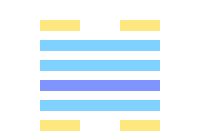
28.3 (28 > 47) - THE TÂ KWO HEXAGRAM.
The third line, undivided, shows a beam that is weak. There will be evil.
Bing DeepL Google Yandex28.3 (28 > 47) - Tá kvoh, le grand excès
Tá kvoh : 1. Grand excès, défaut, manquement ; 2. Traverser, dépasser.
Une poutre, un pilier trop faible (voir texte I) sont mauvais (ils ne peuvent supporter) (grand défaut).
Bing DeepL Google Yandex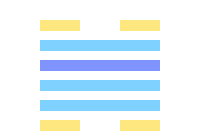
28.4 (28 > 48) - THE TÂ KWO HEXAGRAM.
The fourth line, undivided, shows a beam curving upwards. There will be good fortune. If (the subject of it) looks for other (help but that of line one), there will be cause for regret.
Bing DeepL Google Yandex28.4 (28 > 48) - Being weakened
One is supported by others but needs to recover.
Bing DeepL Google Yandex28.4 (28 > 48) - Being weakened
One is supported by others but needs to recover.
Bing DeepL Google Yandex28.4 (28 > 48) - Tá kvoh, le grand excès
Tá kvoh : 1. Grand excès, défaut, manquement ; 2. Traverser, dépasser.
Une colonne haute et forte est bonne ; toute autre est dangereuse (opposition à ce qui précède)
Bing DeepL Google Yandex28.4 (28 > 48) - Être affaibli
On a le soutien des autres mais on a besoin de récupérer.
Bing DeepL Google Yandex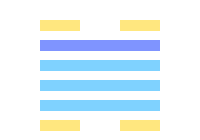
28.5 (28 > 32) - THE TÂ KWO HEXAGRAM.
The fifth line, undivided, shows a decayed willow producing flowers, or an old wife in possession of her young husband. There will be occasion neither for blame nor for praise.
Bing DeepL Google Yandex28.5 (28 > 32) - Renovating the facade
One hurries to repair before others notice the decline.
Bing DeepL Google Yandex28.5 (28 > 32) - Renovating the facade
One hurries to repair before others notice the decline.
Bing DeepL Google Yandex28.5 (28 > 32) - Tá kvoh, le grand excès
Tá kvoh : 1. Grand excès, défaut, manquement ; 2. Traverser, dépasser.
Un vieux saule produisant une fleur, une vieille femme épousant un homme encore jeune, quoique non blâmables, ne peuvent être loués. La fleur du vieux saule ne peut durer, l’époux d’une vieille femme peut s’en dégoûter. (Faits qui passent les règles ordinaires.)
Bing DeepL Google Yandex28.5 (28 > 32) - Ravaler la façade
On se dépêche de réparer avant que les autres ne constatent le déclin.
Bing DeepL Google Yandex28.5 (28 > 32) - Lemondás
Igyekszik javítani mielőtt mások észrevennék a hanyatlást.
Bing DeepL Google Yandex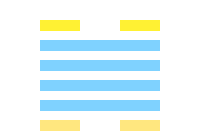
28.6 (28 > 44) - THE TÂ KWO HEXAGRAM.
The topmost line, divided, shows its subject with extraordinary (boldness) wading through a stream, till the water hides the crown of his head. There will be evil, but no ground for blame.
Bing DeepL Google Yandex28.6 (28 > 44) - Losing one's bearings
One wants to continue alone because of the weakness of one's entourage.
Bing DeepL Google Yandex28.6 (28 > 44) - Losing one's bearings
One wants to continue alone because of the weakness of one's entourage.
Bing DeepL Google Yandex28.6 (28 > 44) - Tá kvoh, le grand excès
Tá kvoh : 1. Grand excès, défaut, manquement ; 2. Traverser, dépasser.
Traversant un fleuve, y entrer jusqu’au sommet de la tête est chose dangereuse, (mais peut n’être point blâmable, si on le fait pour aider quelqu’un, d’après le Com.) (3e sens). Force défaillante.
Bing DeepL Google Yandex28.6 (28 > 44) - Perdre ses repères
On veut continuer seul à cause de la faiblesse de son entourage.
Bing DeepL Google Yandex28.6 (28 > 44) - Lemondás
Egyedül akar haladni a környezők gyengesége miatt.
Bing DeepL Google YandexL'hexagramme nucléaire : 1
L'hexagramme nucléaire est l'association des deux trigrammes intérieurs (traits 2,3,4 et 3,4,5). Il représente la racine, ou l'origine de la situation.

1 - THE KHIEN HEXAGRAM
Khien (represents) what is great and originating, penetrating, advantageous, correct and firm.
Bing DeepL Google Yandex1 - K’ien, la créativité
K’ien : principe actif, force vitale universelle.
Texte
(C’est) l’origine, le progrès, l’affermissement et l’achèvement des êtres.
Symbolisme
Ciel en action, puissance suprême. Le sage met toute sa force en action et ne se repose jamais.
Commentaire
Grand est vraiment le principe originaire, le K’ien ! Toutes choses en proviennent. Il est l’origine du Ciel et le comprend tout entier. Les nuages s’y produisent et la pluie s’en répand, tous les différents êtres en tirent leurs formes. Pour expliquer l’origine et la fin de tout, on emploie six lignes en six positions convenables (les koua). Par leur moyen, comme par un char attelé de six dragons, on parcourt le ciel (on en sonde les mystères). L’action régulière du K’ien est de former et de transformer les êtres. Chacun a sa nature et son emploi fixés ; ainsi il maintient l’union et l’harmonie suprêmes. Ainsi toute chose progresse, reçoit ses bienfaits et se perfectionne.
Les chefs s’élèvent au-dessus de tous et, de la sorte, les États ont paix et prospérité. Le ciel se meut et agit avec grande puissance. Ainsi le grand, le sage exerce son activité sans jamais se reposer complètement.
L'hexagramme complémentaire : 27
L'hexagramme accompagnateur qui rend la situation complète.
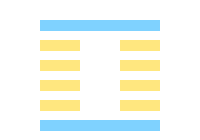
27 - THE Î HEXAGRAM.
Î indicates that with firm correctness there will be good fortune (in what is denoted by it). We must look at what we are seeking to nourish, and by the exercise of our thoughts seek for the proper aliment.
Bing DeepL Google Yandex27 - I, l’alimentation
Ī : 1. Entretenir, soutenir ; 2. Menton, côté de la bouche ; 3. Profond.
Texte
Entretenir : achève heureusement. (Il faut) examiner soigneusement comment on entretient. On doit chercher soi-même ce qui est bon pour sa bouche.
Symbolisme
Une montagne au-dessus du tonnerre (image de celui qui réprime ses désirs, restreint ses tendances). Le sage s’observe ainsi en ses paroles et modère l’usage des aliments.
Commentaire
Entretenir sa rectitude est cause de bonheur. On doit examiner ce que l’on entretient et ce qui doit nous entretenir. Le ciel et la terre entretiennent tout ; le saint entretient la sagesse pour atteindre par eux tous les peuples. Grande est l’opportunité de l’entretien.
L'hexagramme miroir : 28
L'hexagramme miroir montre le mouvement dans la direction inverse. Quand un hexagramme est son propre miroir, cela peut signifier que l'hexagramme se meut dans les deux directions ou bien ne bouge pas.

28 - THE TÂ KWO HEXAGRAM.
Tâ Kwo suggests to us a beam that is weak. There will be advantage in moving (under its conditions) in any direction whatever ; there will be success.
Bing DeepL Google Yandex28 - Loneliness
One goes on their own if necessary. Stick to the essential.
Bing DeepL Google Yandex28 - Loneliness
One goes on their own if necessary. Stick to the essential.
Bing DeepL Google Yandex28 - Tá kvoh, le grand excès
Tá kvoh : 1. Grand excès, défaut, manquement ; 2. Traverser, dépasser.
Texte
Grandeur défectueuse. Appui faible qui, en s’affermissant en toute manière, peut devenir utile. (Un défaut peut se réparer.)
Symbolisme
Marais couvrant des arbres. Le sage, devant un pouvoir vicieux, se tient seul sans crainte et fuit le monde sans regrets.
Commentaire
Grandeur défectueuse, colonne faible dont le haut et le bas le sont aussi. La force défectueuse au milieu de gens faibles et doux peut, si elle agit en cherchant à satisfaire, s’affermir et prospérer en tout. La grandeur excessive ou défectueuse est une chose funeste.
Note. Nous avons ici une collection d’expressions proverbiales dont plusieurs se rapportent à la forme même du Koua. Celui-ci peut, en effet, à la rigueur, figurer une poutre entamée en haut et en bas, donc très défectueuse.
On voit ici une fois de plus combien ces divisions en six parties sont arbitraires. Le § 3 n’est que la répétition du texte ; les §§ 2 et 5 se confondent.
Mutations

28 - THE TÂ KWO HEXAGRAM.
Tâ Kwo suggests to us a beam that is weak. There will be advantage in moving (under its conditions) in any direction whatever ; there will be success.
Bing DeepL Google Yandex28 - Loneliness
One goes on their own if necessary. Stick to the essential.
Bing DeepL Google Yandex28 - Loneliness
One goes on their own if necessary. Stick to the essential.
Bing DeepL Google Yandex28 - Tá kvoh, le grand excès
Tá kvoh : 1. Grand excès, défaut, manquement ; 2. Traverser, dépasser.
Texte
Grandeur défectueuse. Appui faible qui, en s’affermissant en toute manière, peut devenir utile. (Un défaut peut se réparer.)
Symbolisme
Marais couvrant des arbres. Le sage, devant un pouvoir vicieux, se tient seul sans crainte et fuit le monde sans regrets.
Commentaire
Grandeur défectueuse, colonne faible dont le haut et le bas le sont aussi. La force défectueuse au milieu de gens faibles et doux peut, si elle agit en cherchant à satisfaire, s’affermir et prospérer en tout. La grandeur excessive ou défectueuse est une chose funeste.
Note. Nous avons ici une collection d’expressions proverbiales dont plusieurs se rapportent à la forme même du Koua. Celui-ci peut, en effet, à la rigueur, figurer une poutre entamée en haut et en bas, donc très défectueuse.
On voit ici une fois de plus combien ces divisions en six parties sont arbitraires. Le § 3 n’est que la répétition du texte ; les §§ 2 et 5 se confondent.

28.1 (28 > 43) - THE TÂ KWO HEXAGRAM.
The first line, divided, shows one placing mats of the white mâo grass under things set on the ground. There will be no error.
Bing DeepL Google Yandex28.1 (28 > 43) - Reinforcing supports
One wants to improve because of the weakness.
Bing DeepL Google Yandex28.1 (28 > 43) - Strengthening supports
One wants to improve because of the weakness.
Bing DeepL Google Yandex28.1 (28 > 43) - Tá kvoh, le grand excès
Tá kvoh : 1. Grand excès, défaut, manquement ; 2. Traverser, dépasser.
Ceci est susceptible de deux explications : a. « S’appuyer sur des joncs » est un grand défaut ; ils plient et ne soutiennent pas. b. Pour placer un objet comme natte à offrande, se servir de mao blanc est fautif.
Note. Au lieu de gratter simplement la terre et l’aplanir.
(Le mao blanc représente la pureté, la droiture, kiet tche. Ceci d’après le commentaire représente un excès de précaution. Kwéh hu weï shin (1er sens).
28.1 (28 > 43) - Renforcer les soutiens
On veut améliorer à cause de la faiblesse.
Bing DeepL Google Yandex
28.2 (28 > 31) - THE TÂ KWO HEXAGRAM.
The second line, undivided, shows a decayed willow producing shoots, or an old husband in possession of his young wife. There will be advantage in every way.
Bing DeepL Google Yandex28.2 (28 > 31) - Nurturing hope
When one encounters difficulties, one welcomes the weakest to secure their future.
Bing DeepL Google Yandex28.2 (28 > 31) - Nurturing hope
When one encounters difficulties, one welcomes the weakest to secure their future.
Bing DeepL Google Yandex28.2 (28 > 31) - Tá kvoh, le grand excès
Tá kvoh : 1. Grand excès, défaut, manquement ; 2. Traverser, dépasser.
- 2.
28.2 (28 > 31) - Entretenir l'espoir
Quand on rencontre des difficultés, on accueille les plus faibles pour assurer leur avenir.
Bing DeepL Google Yandex28.2 (28 > 31) - Lemondás
Ha valaki nehézségekbe ütközik, emelje fel a leggyengébbet is hogy megőrizhesse jövőjét.
Bing DeepL Google Yandex
28.1.2 (28 > 49) - THE TÂ KWO HEXAGRAM.
- 1. The first line, divided, shows one placing mats of the white mâo grass under things set on the ground. There will be no error.
- 2. The second line, undivided, shows a decayed willow producing shoots, or an old husband in possession of his young wife. There will be advantage in every way.
28.1.2 (28 > 49) - Selling one's goods
One experiments with a new method that will correct the defects that are currently observed.
Bing DeepL Google Yandex28.1.2 (28 > 49) - Selling one's goods
One experiments with a new method that will correct the defects that are currently observed.
Bing DeepL Google Yandex28.1.2 (28 > 49) - Tá kvoh, le grand excès
Tá kvoh : 1. Grand excès, défaut, manquement ; 2. Traverser, dépasser.
-
1. Ceci est susceptible de deux explications : a. « S’appuyer sur des joncs » est un grand défaut ; ils plient et ne soutiennent pas. b. Pour placer un objet comme natte à offrande, se servir de mao blanc est fautif.
Note. Au lieu de gratter simplement la terre et l’aplanir.
(Le mao blanc représente la pureté, la droiture, kiet tche. Ceci d’après le commentaire représente un excès de précaution. Kwéh hu weï shin (1er sens). - 2.
28.1.2 (28 > 49) - Vendre ses biens
On expérimente une nouvelle méthode qui corrigera les défauts que l'on constate actuellement.
Bing DeepL Google Yandex28.1.2 (28 > 49) - Lemondás
- 1. Fejlődni akar a gyengeség miatt.
- 2. Ha valaki nehézségekbe ütközik, emelje fel a leggyengébbet is hogy megőrizhesse jövőjét.

28.3 (28 > 47) - THE TÂ KWO HEXAGRAM.
The third line, undivided, shows a beam that is weak. There will be evil.
Bing DeepL Google Yandex28.3 (28 > 47) - Tá kvoh, le grand excès
Tá kvoh : 1. Grand excès, défaut, manquement ; 2. Traverser, dépasser.
Une poutre, un pilier trop faible (voir texte I) sont mauvais (ils ne peuvent supporter) (grand défaut).
Bing DeepL Google Yandex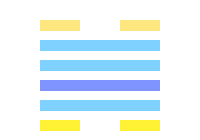
28.1.3 (28 > 58) - THE TÂ KWO HEXAGRAM.
- 1. The first line, divided, shows one placing mats of the white mâo grass under things set on the ground. There will be no error.
- 3. The third line, undivided, shows a beam that is weak. There will be evil.
28.1.3 (28 > 58) - Requiring more surveilance
One asks one's agents to keep an eye on the actions of others.
Bing DeepL Google Yandex28.1.3 (28 > 58) - Requiring more surveilance
One asks one's agents to keep an eye on the actions of others.
Bing DeepL Google Yandex28.1.3 (28 > 58) - Tá kvoh, le grand excès
Tá kvoh : 1. Grand excès, défaut, manquement ; 2. Traverser, dépasser.
-
1. Ceci est susceptible de deux explications : a. « S’appuyer sur des joncs » est un grand défaut ; ils plient et ne soutiennent pas. b. Pour placer un objet comme natte à offrande, se servir de mao blanc est fautif.
Note. Au lieu de gratter simplement la terre et l’aplanir.
(Le mao blanc représente la pureté, la droiture, kiet tche. Ceci d’après le commentaire représente un excès de précaution. Kwéh hu weï shin (1er sens). - 3. Une poutre, un pilier trop faible (voir texte I) sont mauvais (ils ne peuvent supporter) (grand défaut).
28.1.3 (28 > 58) - Réclamer plus de surveillance
On demande à ses agents de garder un œil sur les agissements des autres.
Bing DeepL Google Yandex28.1.3 (28 > 58) - Lemondás
- 1. Fejlődni akar a gyengeség miatt.
- 3. Ápolja kapcsolatait.
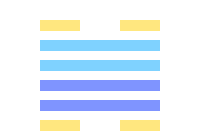
28.2.3 (28 > 45) - THE TÂ KWO HEXAGRAM.
- 2. The second line, undivided, shows a decayed willow producing shoots, or an old husband in possession of his young wife. There will be advantage in every way.
- 3. The third line, undivided, shows a beam that is weak. There will be evil.
28.2.3 (28 > 45) - Mediating
One is standing between those who want to fight it out.
Bing DeepL Google Yandex28.2.3 (28 > 45) - Mediating
One is standing between those who want to fight it out.
Bing DeepL Google Yandex28.2.3 (28 > 45) - Tá kvoh, le grand excès
Tá kvoh : 1. Grand excès, défaut, manquement ; 2. Traverser, dépasser.
- 2.
- 3. Une poutre, un pilier trop faible (voir texte I) sont mauvais (ils ne peuvent supporter) (grand défaut).
28.2.3 (28 > 45) - Faire une médiation
On s'entremet entre ceux qui veulent en découdre.
Bing DeepL Google Yandex28.2.3 (28 > 45) - Lemondás
- 2. Ha valaki nehézségekbe ütközik, emelje fel a leggyengébbet is hogy megőrizhesse jövőjét.
- 3. Ápolja kapcsolatait.
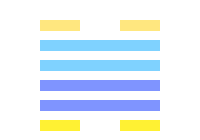
28.1.2.3 (28 > 17) - THE TÂ KWO HEXAGRAM.
- 1. The first line, divided, shows one placing mats of the white mâo grass under things set on the ground. There will be no error.
- 2. The second line, undivided, shows a decayed willow producing shoots, or an old husband in possession of his young wife. There will be advantage in every way.
- 3. The third line, undivided, shows a beam that is weak. There will be evil.
28.1.2.3 (28 > 17) - Trying one's luck
One takes a calculated risk to show others what one can do.
Bing DeepL Google Yandex28.1.2.3 (28 > 17) - Trying one's luck
One takes a calculated risk to show others what one can do.
Bing DeepL Google Yandex28.1.2.3 (28 > 17) - Tá kvoh, le grand excès
Tá kvoh : 1. Grand excès, défaut, manquement ; 2. Traverser, dépasser.
-
1. Ceci est susceptible de deux explications : a. « S’appuyer sur des joncs » est un grand défaut ; ils plient et ne soutiennent pas. b. Pour placer un objet comme natte à offrande, se servir de mao blanc est fautif.
Note. Au lieu de gratter simplement la terre et l’aplanir.
(Le mao blanc représente la pureté, la droiture, kiet tche. Ceci d’après le commentaire représente un excès de précaution. Kwéh hu weï shin (1er sens). - 2.
- 3. Une poutre, un pilier trop faible (voir texte I) sont mauvais (ils ne peuvent supporter) (grand défaut).
28.1.2.3 (28 > 17) - Tenter sa chance
On prend un risque calculé pour montrer aux autres ce que l'on sait faire.
Bing DeepL Google Yandex28.1.2.3 (28 > 17) - Lemondás
- 1. Fejlődni akar a gyengeség miatt.
- 2. Ha valaki nehézségekbe ütközik, emelje fel a leggyengébbet is hogy megőrizhesse jövőjét.
- 3. Ápolja kapcsolatait.

28.4 (28 > 48) - THE TÂ KWO HEXAGRAM.
The fourth line, undivided, shows a beam curving upwards. There will be good fortune. If (the subject of it) looks for other (help but that of line one), there will be cause for regret.
Bing DeepL Google Yandex28.4 (28 > 48) - Being weakened
One is supported by others but needs to recover.
Bing DeepL Google Yandex28.4 (28 > 48) - Being weakened
One is supported by others but needs to recover.
Bing DeepL Google Yandex28.4 (28 > 48) - Tá kvoh, le grand excès
Tá kvoh : 1. Grand excès, défaut, manquement ; 2. Traverser, dépasser.
Une colonne haute et forte est bonne ; toute autre est dangereuse (opposition à ce qui précède)
Bing DeepL Google Yandex28.4 (28 > 48) - Être affaibli
On a le soutien des autres mais on a besoin de récupérer.
Bing DeepL Google Yandex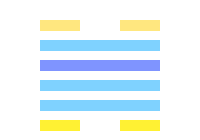
28.1.4 (28 > 5) - THE TÂ KWO HEXAGRAM.
- 1. The first line, divided, shows one placing mats of the white mâo grass under things set on the ground. There will be no error.
- 4. The fourth line, undivided, shows a beam curving upwards. There will be good fortune. If (the subject of it) looks for other (help but that of line one), there will be cause for regret.
28.1.4 (28 > 5) - Recharging one's batteries before action
One draws strength so one won't have to regret having left.
Bing DeepL Google Yandex28.1.4 (28 > 5) - Recharging one's batteries before action
One draws strength so one won't have to regret having left.
Bing DeepL Google Yandex28.1.4 (28 > 5) - Tá kvoh, le grand excès
Tá kvoh : 1. Grand excès, défaut, manquement ; 2. Traverser, dépasser.
-
1. Ceci est susceptible de deux explications : a. « S’appuyer sur des joncs » est un grand défaut ; ils plient et ne soutiennent pas. b. Pour placer un objet comme natte à offrande, se servir de mao blanc est fautif.
Note. Au lieu de gratter simplement la terre et l’aplanir.
(Le mao blanc représente la pureté, la droiture, kiet tche. Ceci d’après le commentaire représente un excès de précaution. Kwéh hu weï shin (1er sens). - 4. Une colonne haute et forte est bonne ; toute autre est dangereuse (opposition à ce qui précède)
28.1.4 (28 > 5) - Se ressourcer avant l'action
On puise des forces pour ne pas avoir à regretter d'être parti.
Bing DeepL Google Yandex28.1.4 (28 > 5) - Lemondás
- 1. Fejlődni akar a gyengeség miatt.
- 4. Mások támogatják de még fel kell épülnie.
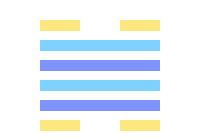
28.2.4 (28 > 39) - THE TÂ KWO HEXAGRAM.
- 2. The second line, undivided, shows a decayed willow producing shoots, or an old husband in possession of his young wife. There will be advantage in every way.
- 4. The fourth line, undivided, shows a beam curving upwards. There will be good fortune. If (the subject of it) looks for other (help but that of line one), there will be cause for regret.
28.2.4 (28 > 39) - Lacking patience
One is downgrading one's chances of success.
Bing DeepL Google Yandex28.2.4 (28 > 39) - Lacking patience
One is downgrading one's chances of success.
Bing DeepL Google Yandex28.2.4 (28 > 39) - Tá kvoh, le grand excès
Tá kvoh : 1. Grand excès, défaut, manquement ; 2. Traverser, dépasser.
- 2.
- 4. Une colonne haute et forte est bonne ; toute autre est dangereuse (opposition à ce qui précède)
28.2.4 (28 > 39) - Manquer de patience
On revoit à la baisse ses chances de succès.
Bing DeepL Google Yandex28.2.4 (28 > 39) - Lemondás
- 2. Ha valaki nehézségekbe ütközik, emelje fel a leggyengébbet is hogy megőrizhesse jövőjét.
- 4. Mások támogatják de még fel kell épülnie.
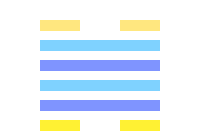
28.1.2.4 (28 > 63) - THE TÂ KWO HEXAGRAM.
- 1. The first line, divided, shows one placing mats of the white mâo grass under things set on the ground. There will be no error.
- 2. The second line, undivided, shows a decayed willow producing shoots, or an old husband in possession of his young wife. There will be advantage in every way.
- 4. The fourth line, undivided, shows a beam curving upwards. There will be good fortune. If (the subject of it) looks for other (help but that of line one), there will be cause for regret.
28.1.2.4 (28 > 63) - Keeping promises
One informs one's entourage of the arrival of the first products of the year.
Bing DeepL Google Yandex28.1.2.4 (28 > 63) - Keeping promises
One informs one's entourage of the arrival of the first products of the year.
Bing DeepL Google Yandex28.1.2.4 (28 > 63) - Tá kvoh, le grand excès
Tá kvoh : 1. Grand excès, défaut, manquement ; 2. Traverser, dépasser.
-
1. Ceci est susceptible de deux explications : a. « S’appuyer sur des joncs » est un grand défaut ; ils plient et ne soutiennent pas. b. Pour placer un objet comme natte à offrande, se servir de mao blanc est fautif.
Note. Au lieu de gratter simplement la terre et l’aplanir.
(Le mao blanc représente la pureté, la droiture, kiet tche. Ceci d’après le commentaire représente un excès de précaution. Kwéh hu weï shin (1er sens). - 2.
- 4. Une colonne haute et forte est bonne ; toute autre est dangereuse (opposition à ce qui précède)
28.1.2.4 (28 > 63) - Tenir ses promesses
On prévient son entourage de l'arrivée des premiers produits de l'année.
Bing DeepL Google Yandex28.1.2.4 (28 > 63) - Lemondás
- 1. Fejlődni akar a gyengeség miatt.
- 2. Ha valaki nehézségekbe ütközik, emelje fel a leggyengébbet is hogy megőrizhesse jövőjét.
- 4. Mások támogatják de még fel kell épülnie.
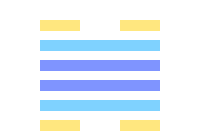
28.3.4 (28 > 29) - THE TÂ KWO HEXAGRAM.
- 3. The third line, undivided, shows a beam that is weak. There will be evil.
- 4. The fourth line, undivided, shows a beam curving upwards. There will be good fortune. If (the subject of it) looks for other (help but that of line one), there will be cause for regret.
28.3.4 (28 > 29) - Contradicting those who are sincere
One commits irreparable mistakes in attempting to overtake others.
Bing DeepL Google Yandex28.3.4 (28 > 29) - Contradicting those who are sincere
One commits irreparable mistakes in attempting to overtake others.
Bing DeepL Google Yandex28.3.4 (28 > 29) - Tá kvoh, le grand excès
Tá kvoh : 1. Grand excès, défaut, manquement ; 2. Traverser, dépasser.
- 3. Une poutre, un pilier trop faible (voir texte I) sont mauvais (ils ne peuvent supporter) (grand défaut).
- 4. Une colonne haute et forte est bonne ; toute autre est dangereuse (opposition à ce qui précède)
28.3.4 (28 > 29) - Contredire ceux qui sont sincères
On commet des erreurs irréparables en tentant de prendre l'ascendant sur les autres.
Bing DeepL Google Yandex28.3.4 (28 > 29) - Lemondás
- 3. Ápolja kapcsolatait.
- 4. Mások támogatják de még fel kell épülnie.
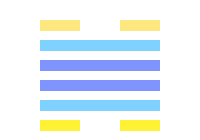
28.1.3.4 (28 > 60) - THE TÂ KWO HEXAGRAM.
- 1. The first line, divided, shows one placing mats of the white mâo grass under things set on the ground. There will be no error.
- 3. The third line, undivided, shows a beam that is weak. There will be evil.
- 4. The fourth line, undivided, shows a beam curving upwards. There will be good fortune. If (the subject of it) looks for other (help but that of line one), there will be cause for regret.
28.1.3.4 (28 > 60) - Being uncompromising
One stops lecturing to take action.
Bing DeepL Google Yandex28.1.3.4 (28 > 60) - Being uncompromising
One stops lecturing to take action.
Bing DeepL Google Yandex28.1.3.4 (28 > 60) - Tá kvoh, le grand excès
Tá kvoh : 1. Grand excès, défaut, manquement ; 2. Traverser, dépasser.
-
1. Ceci est susceptible de deux explications : a. « S’appuyer sur des joncs » est un grand défaut ; ils plient et ne soutiennent pas. b. Pour placer un objet comme natte à offrande, se servir de mao blanc est fautif.
Note. Au lieu de gratter simplement la terre et l’aplanir.
(Le mao blanc représente la pureté, la droiture, kiet tche. Ceci d’après le commentaire représente un excès de précaution. Kwéh hu weï shin (1er sens). - 3. Une poutre, un pilier trop faible (voir texte I) sont mauvais (ils ne peuvent supporter) (grand défaut).
- 4. Une colonne haute et forte est bonne ; toute autre est dangereuse (opposition à ce qui précède)
28.1.3.4 (28 > 60) - Être inflexible
On arrête de faire de la morale pour passer à l'action.
Bing DeepL Google Yandex28.1.3.4 (28 > 60) - Lemondás
- 1. Fejlődni akar a gyengeség miatt.
- 3. Ápolja kapcsolatait.
- 4. Mások támogatják de még fel kell épülnie.
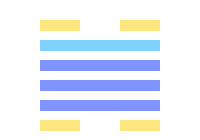
28.2.3.4 (28 > 8) - THE TÂ KWO HEXAGRAM.
- 2. The second line, undivided, shows a decayed willow producing shoots, or an old husband in possession of his young wife. There will be advantage in every way.
- 3. The third line, undivided, shows a beam that is weak. There will be evil.
- 4. The fourth line, undivided, shows a beam curving upwards. There will be good fortune. If (the subject of it) looks for other (help but that of line one), there will be cause for regret.
28.2.3.4 (28 > 8) - Being straightforward
One gives up the superfluous to go straight to the point.
Bing DeepL Google Yandex28.2.3.4 (28 > 8) - Being straightforward
One gives up the superfluous to go straight to the point.
Bing DeepL Google Yandex28.2.3.4 (28 > 8) - Tá kvoh, le grand excès
Tá kvoh : 1. Grand excès, défaut, manquement ; 2. Traverser, dépasser.
- 2.
- 3. Une poutre, un pilier trop faible (voir texte I) sont mauvais (ils ne peuvent supporter) (grand défaut).
- 4. Une colonne haute et forte est bonne ; toute autre est dangereuse (opposition à ce qui précède)
28.2.3.4 (28 > 8) - Être direct
On se passe du superflu pour aller droit au but.
Bing DeepL Google Yandex28.2.3.4 (28 > 8) - Lemondás
- 2. Ha valaki nehézségekbe ütközik, emelje fel a leggyengébbet is hogy megőrizhesse jövőjét.
- 3. Ápolja kapcsolatait.
- 4. Mások támogatják de még fel kell épülnie.
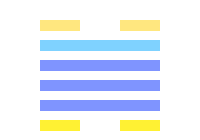
28.1.2.3.4 (28 > 3) - THE TÂ KWO HEXAGRAM.
- 1. The first line, divided, shows one placing mats of the white mâo grass under things set on the ground. There will be no error.
- 2. The second line, undivided, shows a decayed willow producing shoots, or an old husband in possession of his young wife. There will be advantage in every way.
- 3. The third line, undivided, shows a beam that is weak. There will be evil.
- 4. The fourth line, undivided, shows a beam curving upwards. There will be good fortune. If (the subject of it) looks for other (help but that of line one), there will be cause for regret.
28.1.2.3.4 (28 > 3) - Keeping one's secrets
Others may ask for proofs without the need to satisfy them.
Bing DeepL Google Yandex28.1.2.3.4 (28 > 3) - Keeping one's secrets
Others may ask for proofs without the need to satisfy them.
Bing DeepL Google Yandex28.1.2.3.4 (28 > 3) - Tá kvoh, le grand excès
Tá kvoh : 1. Grand excès, défaut, manquement ; 2. Traverser, dépasser.
-
1. Ceci est susceptible de deux explications : a. « S’appuyer sur des joncs » est un grand défaut ; ils plient et ne soutiennent pas. b. Pour placer un objet comme natte à offrande, se servir de mao blanc est fautif.
Note. Au lieu de gratter simplement la terre et l’aplanir.
(Le mao blanc représente la pureté, la droiture, kiet tche. Ceci d’après le commentaire représente un excès de précaution. Kwéh hu weï shin (1er sens). - 2.
- 3. Une poutre, un pilier trop faible (voir texte I) sont mauvais (ils ne peuvent supporter) (grand défaut).
- 4. Une colonne haute et forte est bonne ; toute autre est dangereuse (opposition à ce qui précède)
28.1.2.3.4 (28 > 3) - Garder ses secrets
Les autres peuvent réclamer des preuves sans qu'on ait besoin de les satisfaire.
Bing DeepL Google Yandex28.1.2.3.4 (28 > 3) - Lemondás
- 1. Fejlődni akar a gyengeség miatt.
- 2. Ha valaki nehézségekbe ütközik, emelje fel a leggyengébbet is hogy megőrizhesse jövőjét.
- 3. Ápolja kapcsolatait.
- 4. Mások támogatják de még fel kell épülnie.

28.5 (28 > 32) - THE TÂ KWO HEXAGRAM.
The fifth line, undivided, shows a decayed willow producing flowers, or an old wife in possession of her young husband. There will be occasion neither for blame nor for praise.
Bing DeepL Google Yandex28.5 (28 > 32) - Renovating the facade
One hurries to repair before others notice the decline.
Bing DeepL Google Yandex28.5 (28 > 32) - Renovating the facade
One hurries to repair before others notice the decline.
Bing DeepL Google Yandex28.5 (28 > 32) - Tá kvoh, le grand excès
Tá kvoh : 1. Grand excès, défaut, manquement ; 2. Traverser, dépasser.
Un vieux saule produisant une fleur, une vieille femme épousant un homme encore jeune, quoique non blâmables, ne peuvent être loués. La fleur du vieux saule ne peut durer, l’époux d’une vieille femme peut s’en dégoûter. (Faits qui passent les règles ordinaires.)
Bing DeepL Google Yandex28.5 (28 > 32) - Ravaler la façade
On se dépêche de réparer avant que les autres ne constatent le déclin.
Bing DeepL Google Yandex28.5 (28 > 32) - Lemondás
Igyekszik javítani mielőtt mások észrevennék a hanyatlást.
Bing DeepL Google Yandex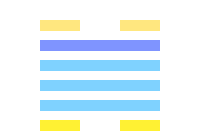
28.1.5 (28 > 34) - THE TÂ KWO HEXAGRAM.
- 1. The first line, divided, shows one placing mats of the white mâo grass under things set on the ground. There will be no error.
- 5. The fifth line, undivided, shows a decayed willow producing flowers, or an old wife in possession of her young husband. There will be occasion neither for blame nor for praise.
28.1.5 (28 > 34) - Continuing alone
One asks the weakest to return home to rest and one takes care of the disorder.
Bing DeepL Google Yandex28.1.5 (28 > 34) - Continuing alone
One asks the weakest to return home to rest and one takes care of the disorder.
Bing DeepL Google Yandex28.1.5 (28 > 34) - Tá kvoh, le grand excès
Tá kvoh : 1. Grand excès, défaut, manquement ; 2. Traverser, dépasser.
-
1. Ceci est susceptible de deux explications : a. « S’appuyer sur des joncs » est un grand défaut ; ils plient et ne soutiennent pas. b. Pour placer un objet comme natte à offrande, se servir de mao blanc est fautif.
Note. Au lieu de gratter simplement la terre et l’aplanir.
(Le mao blanc représente la pureté, la droiture, kiet tche. Ceci d’après le commentaire représente un excès de précaution. Kwéh hu weï shin (1er sens). - 5. Un vieux saule produisant une fleur, une vieille femme épousant un homme encore jeune, quoique non blâmables, ne peuvent être loués. La fleur du vieux saule ne peut durer, l’époux d’une vieille femme peut s’en dégoûter. (Faits qui passent les règles ordinaires.)
28.1.5 (28 > 34) - Continuer seul
On demande aux plus faibles de rentrer chez eux pour se reposer et on s’occupe du désordre.
Bing DeepL Google Yandex28.1.5 (28 > 34) - Lemondás
- 1. Fejlődni akar a gyengeség miatt.
- 5. Igyekszik javítani mielőtt mások észrevennék a hanyatlást.
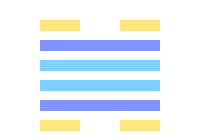
28.2.5 (28 > 62) - THE TÂ KWO HEXAGRAM.
- 2. The second line, undivided, shows a decayed willow producing shoots, or an old husband in possession of his young wife. There will be advantage in every way.
- 5. The fifth line, undivided, shows a decayed willow producing flowers, or an old wife in possession of her young husband. There will be occasion neither for blame nor for praise.
28.2.5 (28 > 62) - Breaking a commitment
One is not ready to solve the problems of others because one went to help one's relatives.
Bing DeepL Google Yandex28.2.5 (28 > 62) - Breaking a commitment
One is not ready to solve the problems of others because one went to help one's relatives.
Bing DeepL Google Yandex28.2.5 (28 > 62) - Tá kvoh, le grand excès
Tá kvoh : 1. Grand excès, défaut, manquement ; 2. Traverser, dépasser.
- 2.
- 5. Un vieux saule produisant une fleur, une vieille femme épousant un homme encore jeune, quoique non blâmables, ne peuvent être loués. La fleur du vieux saule ne peut durer, l’époux d’une vieille femme peut s’en dégoûter. (Faits qui passent les règles ordinaires.)
28.2.5 (28 > 62) - Rompre un engagement
On n’est pas prêt à résoudre les problèmes des autres parce qu’on est parti aider ses proches.
Bing DeepL Google Yandex28.2.5 (28 > 62) - Lemondás
- 2. Ha valaki nehézségekbe ütközik, emelje fel a leggyengébbet is hogy megőrizhesse jövőjét.
- 5. Igyekszik javítani mielőtt mások észrevennék a hanyatlást.
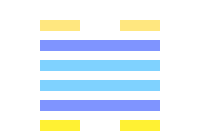
28.1.2.5 (28 > 55) - THE TÂ KWO HEXAGRAM.
- 1. The first line, divided, shows one placing mats of the white mâo grass under things set on the ground. There will be no error.
- 2. The second line, undivided, shows a decayed willow producing shoots, or an old husband in possession of his young wife. There will be advantage in every way.
- 5. The fifth line, undivided, shows a decayed willow producing flowers, or an old wife in possession of her young husband. There will be occasion neither for blame nor for praise.
28.1.2.5 (28 > 55) - Loneliness
One languishes in the expectation of an honest judgment.
Bing DeepL Google Yandex28.1.2.5 (28 > 55) - Loneliness
One languishes in the expectation of an honest judgment.
Bing DeepL Google Yandex28.1.2.5 (28 > 55) - Tá kvoh, le grand excès
Tá kvoh : 1. Grand excès, défaut, manquement ; 2. Traverser, dépasser.
-
1. Ceci est susceptible de deux explications : a. « S’appuyer sur des joncs » est un grand défaut ; ils plient et ne soutiennent pas. b. Pour placer un objet comme natte à offrande, se servir de mao blanc est fautif.
Note. Au lieu de gratter simplement la terre et l’aplanir.
(Le mao blanc représente la pureté, la droiture, kiet tche. Ceci d’après le commentaire représente un excès de précaution. Kwéh hu weï shin (1er sens). - 2.
- 5. Un vieux saule produisant une fleur, une vieille femme épousant un homme encore jeune, quoique non blâmables, ne peuvent être loués. La fleur du vieux saule ne peut durer, l’époux d’une vieille femme peut s’en dégoûter. (Faits qui passent les règles ordinaires.)
28.1.2.5 (28 > 55) - La solitude
On croupit dans l'attente d'un jugement honnête.
Bing DeepL Google Yandex28.1.2.5 (28 > 55) - Lemondás
- 1. Fejlődni akar a gyengeség miatt.
- 2. Ha valaki nehézségekbe ütközik, emelje fel a leggyengébbet is hogy megőrizhesse jövőjét.
- 5. Igyekszik javítani mielőtt mások észrevennék a hanyatlást.
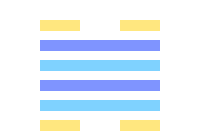
28.3.5 (28 > 40) - THE TÂ KWO HEXAGRAM.
- 3. The third line, undivided, shows a beam that is weak. There will be evil.
- 5. The fifth line, undivided, shows a decayed willow producing flowers, or an old wife in possession of her young husband. There will be occasion neither for blame nor for praise.
28.3.5 (28 > 40) - Making a flop
One becomes the target of mockery when others learn that one has been disappointing.
Bing DeepL Google Yandex28.3.5 (28 > 40) - Making a flop
One becomes the target of mockery when others learn that one has been disappointing.
Bing DeepL Google Yandex28.3.5 (28 > 40) - Tá kvoh, le grand excès
Tá kvoh : 1. Grand excès, défaut, manquement ; 2. Traverser, dépasser.
- 3. Une poutre, un pilier trop faible (voir texte I) sont mauvais (ils ne peuvent supporter) (grand défaut).
- 5. Un vieux saule produisant une fleur, une vieille femme épousant un homme encore jeune, quoique non blâmables, ne peuvent être loués. La fleur du vieux saule ne peut durer, l’époux d’une vieille femme peut s’en dégoûter. (Faits qui passent les règles ordinaires.)
28.3.5 (28 > 40) - Faire un flop
On devient la cible de moqueries quand les autres apprennent qu'on a été décevant.
Bing DeepL Google Yandex28.3.5 (28 > 40) - Lemondás
- 3. Ápolja kapcsolatait.
- 5. Igyekszik javítani mielőtt mások észrevennék a hanyatlást.
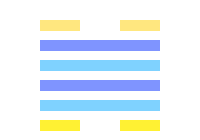
28.1.3.5 (28 > 54) - THE TÂ KWO HEXAGRAM.
- 1. The first line, divided, shows one placing mats of the white mâo grass under things set on the ground. There will be no error.
- 3. The third line, undivided, shows a beam that is weak. There will be evil.
- 5. The fifth line, undivided, shows a decayed willow producing flowers, or an old wife in possession of her young husband. There will be occasion neither for blame nor for praise.
28.1.3.5 (28 > 54) - Losing control
When one is frivolous one does not care about the future of one's children.
Bing DeepL Google Yandex28.1.3.5 (28 > 54) - Losing control
When one is frivolous one does not care about the future of one's children.
Bing DeepL Google Yandex28.1.3.5 (28 > 54) - Tá kvoh, le grand excès
Tá kvoh : 1. Grand excès, défaut, manquement ; 2. Traverser, dépasser.
-
1. Ceci est susceptible de deux explications : a. « S’appuyer sur des joncs » est un grand défaut ; ils plient et ne soutiennent pas. b. Pour placer un objet comme natte à offrande, se servir de mao blanc est fautif.
Note. Au lieu de gratter simplement la terre et l’aplanir.
(Le mao blanc représente la pureté, la droiture, kiet tche. Ceci d’après le commentaire représente un excès de précaution. Kwéh hu weï shin (1er sens). - 3. Une poutre, un pilier trop faible (voir texte I) sont mauvais (ils ne peuvent supporter) (grand défaut).
- 5. Un vieux saule produisant une fleur, une vieille femme épousant un homme encore jeune, quoique non blâmables, ne peuvent être loués. La fleur du vieux saule ne peut durer, l’époux d’une vieille femme peut s’en dégoûter. (Faits qui passent les règles ordinaires.)
28.1.3.5 (28 > 54) - Perdre le contrôle
Quand on est frivole on ne se soucie pas de l'avenir de ses enfants.
Bing DeepL Google Yandex28.1.3.5 (28 > 54) - Lemondás
- 1. Fejlődni akar a gyengeség miatt.
- 3. Ápolja kapcsolatait.
- 5. Igyekszik javítani mielőtt mások észrevennék a hanyatlást.
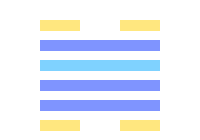
28.2.3.5 (28 > 16) - THE TÂ KWO HEXAGRAM.
- 2. The second line, undivided, shows a decayed willow producing shoots, or an old husband in possession of his young wife. There will be advantage in every way.
- 3. The third line, undivided, shows a beam that is weak. There will be evil.
- 5. The fifth line, undivided, shows a decayed willow producing flowers, or an old wife in possession of her young husband. There will be occasion neither for blame nor for praise.
28.2.3.5 (28 > 16) - Continuing one's training as an assistant.
One hurries to prepare oneself to learn to respond without hesitation.
Bing DeepL Google Yandex28.2.3.5 (28 > 16) - Continuing one's training as an assistant.
One hurries to prepare oneself to learn to respond without hesitation.
Bing DeepL Google Yandex28.2.3.5 (28 > 16) - Tá kvoh, le grand excès
Tá kvoh : 1. Grand excès, défaut, manquement ; 2. Traverser, dépasser.
- 2.
- 3. Une poutre, un pilier trop faible (voir texte I) sont mauvais (ils ne peuvent supporter) (grand défaut).
- 5. Un vieux saule produisant une fleur, une vieille femme épousant un homme encore jeune, quoique non blâmables, ne peuvent être loués. La fleur du vieux saule ne peut durer, l’époux d’une vieille femme peut s’en dégoûter. (Faits qui passent les règles ordinaires.)
28.2.3.5 (28 > 16) - Continuer sa formation d’assistant.
On se dépêche de se préparer pour apprendre à répondre sans hésiter.
Bing DeepL Google Yandex28.2.3.5 (28 > 16) - Lemondás
- 2. Ha valaki nehézségekbe ütközik, emelje fel a leggyengébbet is hogy megőrizhesse jövőjét.
- 3. Ápolja kapcsolatait.
- 5. Igyekszik javítani mielőtt mások észrevennék a hanyatlást.
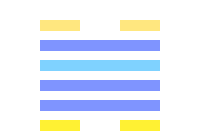
28.1.2.3.5 (28 > 51) - THE TÂ KWO HEXAGRAM.
- 1. The first line, divided, shows one placing mats of the white mâo grass under things set on the ground. There will be no error.
- 2. The second line, undivided, shows a decayed willow producing shoots, or an old husband in possession of his young wife. There will be advantage in every way.
- 3. The third line, undivided, shows a beam that is weak. There will be evil.
- 5. The fifth line, undivided, shows a decayed willow producing flowers, or an old wife in possession of her young husband. There will be occasion neither for blame nor for praise.
28.1.2.3.5 (28 > 51) - Reimbursing down to the last cent
One returns to those who have been dispossessed all the property one has taken from them.
Bing DeepL Google Yandex28.1.2.3.5 (28 > 51) - Reimbursing down to the last cent
One returns to those who have been dispossessed all the property one has taken from them.
Bing DeepL Google Yandex28.1.2.3.5 (28 > 51) - Tá kvoh, le grand excès
Tá kvoh : 1. Grand excès, défaut, manquement ; 2. Traverser, dépasser.
-
1. Ceci est susceptible de deux explications : a. « S’appuyer sur des joncs » est un grand défaut ; ils plient et ne soutiennent pas. b. Pour placer un objet comme natte à offrande, se servir de mao blanc est fautif.
Note. Au lieu de gratter simplement la terre et l’aplanir.
(Le mao blanc représente la pureté, la droiture, kiet tche. Ceci d’après le commentaire représente un excès de précaution. Kwéh hu weï shin (1er sens). - 2.
- 3. Une poutre, un pilier trop faible (voir texte I) sont mauvais (ils ne peuvent supporter) (grand défaut).
- 5. Un vieux saule produisant une fleur, une vieille femme épousant un homme encore jeune, quoique non blâmables, ne peuvent être loués. La fleur du vieux saule ne peut durer, l’époux d’une vieille femme peut s’en dégoûter. (Faits qui passent les règles ordinaires.)
28.1.2.3.5 (28 > 51) - Rembourser jusqu'au dernier centime
On restitue à ceux qui ont été spoliés l'ensemble des biens qu'on leur a pris.
Bing DeepL Google Yandex28.1.2.3.5 (28 > 51) - Lemondás
- 1. Fejlődni akar a gyengeség miatt.
- 2. Ha valaki nehézségekbe ütközik, emelje fel a leggyengébbet is hogy megőrizhesse jövőjét.
- 3. Ápolja kapcsolatait.
- 5. Igyekszik javítani mielőtt mások észrevennék a hanyatlást.
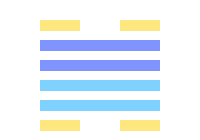
28.4.5 (28 > 46) - THE TÂ KWO HEXAGRAM.
- 4. The fourth line, undivided, shows a beam curving upwards. There will be good fortune. If (the subject of it) looks for other (help but that of line one), there will be cause for regret.
- 5. The fifth line, undivided, shows a decayed willow producing flowers, or an old wife in possession of her young husband. There will be occasion neither for blame nor for praise.
28.4.5 (28 > 46) - Taking a rest
One returns to tell others to stop the work.
Bing DeepL Google Yandex28.4.5 (28 > 46) - Taking a rest
One returns to tell others to stop the work.
Bing DeepL Google Yandex28.4.5 (28 > 46) - Tá kvoh, le grand excès
Tá kvoh : 1. Grand excès, défaut, manquement ; 2. Traverser, dépasser.
- 4. Une colonne haute et forte est bonne ; toute autre est dangereuse (opposition à ce qui précède)
- 5. Un vieux saule produisant une fleur, une vieille femme épousant un homme encore jeune, quoique non blâmables, ne peuvent être loués. La fleur du vieux saule ne peut durer, l’époux d’une vieille femme peut s’en dégoûter. (Faits qui passent les règles ordinaires.)
28.4.5 (28 > 46) - Prendre du repos
On revient pour dire aux autres d'arrêter le travail.
Bing DeepL Google Yandex28.4.5 (28 > 46) - Lemondás
- 4. Mások támogatják de még fel kell épülnie.
- 5. Igyekszik javítani mielőtt mások észrevennék a hanyatlást.
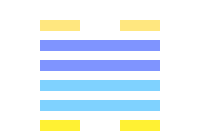
28.1.4.5 (28 > 11) - THE TÂ KWO HEXAGRAM.
- 1. The first line, divided, shows one placing mats of the white mâo grass under things set on the ground. There will be no error.
- 4. The fourth line, undivided, shows a beam curving upwards. There will be good fortune. If (the subject of it) looks for other (help but that of line one), there will be cause for regret.
- 5. The fifth line, undivided, shows a decayed willow producing flowers, or an old wife in possession of her young husband. There will be occasion neither for blame nor for praise.
28.1.4.5 (28 > 11) - Treating the wounded
One cares for those who are condemned to live in the midst of danger.
Bing DeepL Google Yandex28.1.4.5 (28 > 11) - Treating the wounded
One cares for those who are condemned to live in the midst of danger.
Bing DeepL Google Yandex28.1.4.5 (28 > 11) - Tá kvoh, le grand excès
Tá kvoh : 1. Grand excès, défaut, manquement ; 2. Traverser, dépasser.
-
1. Ceci est susceptible de deux explications : a. « S’appuyer sur des joncs » est un grand défaut ; ils plient et ne soutiennent pas. b. Pour placer un objet comme natte à offrande, se servir de mao blanc est fautif.
Note. Au lieu de gratter simplement la terre et l’aplanir.
(Le mao blanc représente la pureté, la droiture, kiet tche. Ceci d’après le commentaire représente un excès de précaution. Kwéh hu weï shin (1er sens). - 4. Une colonne haute et forte est bonne ; toute autre est dangereuse (opposition à ce qui précède)
- 5. Un vieux saule produisant une fleur, une vieille femme épousant un homme encore jeune, quoique non blâmables, ne peuvent être loués. La fleur du vieux saule ne peut durer, l’époux d’une vieille femme peut s’en dégoûter. (Faits qui passent les règles ordinaires.)
28.1.4.5 (28 > 11) - Soigner les blessés
On fait preuve d'égards envers ceux qui sont condamnés à vivre au milieu du danger.
Bing DeepL Google Yandex28.1.4.5 (28 > 11) - Lemondás
- 1. Fejlődni akar a gyengeség miatt.
- 4. Mások támogatják de még fel kell épülnie.
- 5. Igyekszik javítani mielőtt mások észrevennék a hanyatlást.
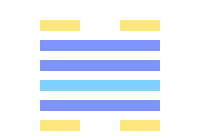
28.2.4.5 (28 > 15) - THE TÂ KWO HEXAGRAM.
- 2. The second line, undivided, shows a decayed willow producing shoots, or an old husband in possession of his young wife. There will be advantage in every way.
- 4. The fourth line, undivided, shows a beam curving upwards. There will be good fortune. If (the subject of it) looks for other (help but that of line one), there will be cause for regret.
- 5. The fifth line, undivided, shows a decayed willow producing flowers, or an old wife in possession of her young husband. There will be occasion neither for blame nor for praise.
28.2.4.5 (28 > 15) - Admitting one's inferiority
One acclaims those who renounce competing for the sake of rectitude.
Bing DeepL Google Yandex28.2.4.5 (28 > 15) - Admitting one's inferiority
One acclaims those who renounce competing for the sake of rectitude.
Bing DeepL Google Yandex28.2.4.5 (28 > 15) - Tá kvoh, le grand excès
Tá kvoh : 1. Grand excès, défaut, manquement ; 2. Traverser, dépasser.
- 2.
- 4. Une colonne haute et forte est bonne ; toute autre est dangereuse (opposition à ce qui précède)
- 5. Un vieux saule produisant une fleur, une vieille femme épousant un homme encore jeune, quoique non blâmables, ne peuvent être loués. La fleur du vieux saule ne peut durer, l’époux d’une vieille femme peut s’en dégoûter. (Faits qui passent les règles ordinaires.)
28.2.4.5 (28 > 15) - Admettre son infériorité
On acclame ceux qui renoncent à concourir par souci de rectitude.
Bing DeepL Google Yandex28.2.4.5 (28 > 15) - Lemondás
- 2. Ha valaki nehézségekbe ütközik, emelje fel a leggyengébbet is hogy megőrizhesse jövőjét.
- 4. Mások támogatják de még fel kell épülnie.
- 5. Igyekszik javítani mielőtt mások észrevennék a hanyatlást.
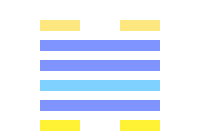
28.1.2.4.5 (28 > 36) - THE TÂ KWO HEXAGRAM.
- 1. The first line, divided, shows one placing mats of the white mâo grass under things set on the ground. There will be no error.
- 2. The second line, undivided, shows a decayed willow producing shoots, or an old husband in possession of his young wife. There will be advantage in every way.
- 4. The fourth line, undivided, shows a beam curving upwards. There will be good fortune. If (the subject of it) looks for other (help but that of line one), there will be cause for regret.
- 5. The fifth line, undivided, shows a decayed willow producing flowers, or an old wife in possession of her young husband. There will be occasion neither for blame nor for praise.
28.1.2.4.5 (28 > 36) - Being unable to make it
One has understood why others did not finish their sentences.
Bing DeepL Google Yandex28.1.2.4.5 (28 > 36) - Being unable to make it
One has understood why others did not finish their sentences.
Bing DeepL Google Yandex28.1.2.4.5 (28 > 36) - Tá kvoh, le grand excès
Tá kvoh : 1. Grand excès, défaut, manquement ; 2. Traverser, dépasser.
-
1. Ceci est susceptible de deux explications : a. « S’appuyer sur des joncs » est un grand défaut ; ils plient et ne soutiennent pas. b. Pour placer un objet comme natte à offrande, se servir de mao blanc est fautif.
Note. Au lieu de gratter simplement la terre et l’aplanir.
(Le mao blanc représente la pureté, la droiture, kiet tche. Ceci d’après le commentaire représente un excès de précaution. Kwéh hu weï shin (1er sens). - 2.
- 4. Une colonne haute et forte est bonne ; toute autre est dangereuse (opposition à ce qui précède)
- 5. Un vieux saule produisant une fleur, une vieille femme épousant un homme encore jeune, quoique non blâmables, ne peuvent être loués. La fleur du vieux saule ne peut durer, l’époux d’une vieille femme peut s’en dégoûter. (Faits qui passent les règles ordinaires.)
28.1.2.4.5 (28 > 36) - Avoir un empêchement
On a compris pourquoi les autres ne terminaient pas leurs phrases.
Bing DeepL Google Yandex28.1.2.4.5 (28 > 36) - Lemondás
- 1. Fejlődni akar a gyengeség miatt.
- 2. Ha valaki nehézségekbe ütközik, emelje fel a leggyengébbet is hogy megőrizhesse jövőjét.
- 4. Mások támogatják de még fel kell épülnie.
- 5. Igyekszik javítani mielőtt mások észrevennék a hanyatlást.
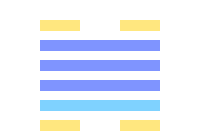
28.3.4.5 (28 > 7) - THE TÂ KWO HEXAGRAM.
- 3. The third line, undivided, shows a beam that is weak. There will be evil.
- 4. The fourth line, undivided, shows a beam curving upwards. There will be good fortune. If (the subject of it) looks for other (help but that of line one), there will be cause for regret.
- 5. The fifth line, undivided, shows a decayed willow producing flowers, or an old wife in possession of her young husband. There will be occasion neither for blame nor for praise.
28.3.4.5 (28 > 7) - Making the journey alone
One wants to produce works without anyone's support.
Bing DeepL Google Yandex28.3.4.5 (28 > 7) - Making the journey alone
One wants to produce works without anyone's support.
Bing DeepL Google Yandex28.3.4.5 (28 > 7) - Tá kvoh, le grand excès
Tá kvoh : 1. Grand excès, défaut, manquement ; 2. Traverser, dépasser.
- 3. Une poutre, un pilier trop faible (voir texte I) sont mauvais (ils ne peuvent supporter) (grand défaut).
- 4. Une colonne haute et forte est bonne ; toute autre est dangereuse (opposition à ce qui précède)
- 5. Un vieux saule produisant une fleur, une vieille femme épousant un homme encore jeune, quoique non blâmables, ne peuvent être loués. La fleur du vieux saule ne peut durer, l’époux d’une vieille femme peut s’en dégoûter. (Faits qui passent les règles ordinaires.)
28.3.4.5 (28 > 7) - Faire la traversée en solitaire
On a envie de réaliser des œuvres sans le soutien de quiconque.
Bing DeepL Google Yandex28.3.4.5 (28 > 7) - Lemondás
- 3. Ápolja kapcsolatait.
- 4. Mások támogatják de még fel kell épülnie.
- 5. Igyekszik javítani mielőtt mások észrevennék a hanyatlást.
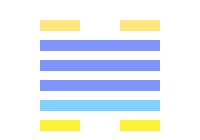
28.1.3.4.5 (28 > 19) - THE TÂ KWO HEXAGRAM.
- 1. The first line, divided, shows one placing mats of the white mâo grass under things set on the ground. There will be no error.
- 3. The third line, undivided, shows a beam that is weak. There will be evil.
- 4. The fourth line, undivided, shows a beam curving upwards. There will be good fortune. If (the subject of it) looks for other (help but that of line one), there will be cause for regret.
- 5. The fifth line, undivided, shows a decayed willow producing flowers, or an old wife in possession of her young husband. There will be occasion neither for blame nor for praise.
28.1.3.4.5 (28 > 19) - Adapting to one's needs
One recalibrates an instrument designed for other uses.
Bing DeepL Google Yandex28.1.3.4.5 (28 > 19) - Adapting to one's needs
One recalibrates an instrument designed for other uses.
Bing DeepL Google Yandex28.1.3.4.5 (28 > 19) - Tá kvoh, le grand excès
Tá kvoh : 1. Grand excès, défaut, manquement ; 2. Traverser, dépasser.
-
1. Ceci est susceptible de deux explications : a. « S’appuyer sur des joncs » est un grand défaut ; ils plient et ne soutiennent pas. b. Pour placer un objet comme natte à offrande, se servir de mao blanc est fautif.
Note. Au lieu de gratter simplement la terre et l’aplanir.
(Le mao blanc représente la pureté, la droiture, kiet tche. Ceci d’après le commentaire représente un excès de précaution. Kwéh hu weï shin (1er sens). - 3. Une poutre, un pilier trop faible (voir texte I) sont mauvais (ils ne peuvent supporter) (grand défaut).
- 4. Une colonne haute et forte est bonne ; toute autre est dangereuse (opposition à ce qui précède)
- 5. Un vieux saule produisant une fleur, une vieille femme épousant un homme encore jeune, quoique non blâmables, ne peuvent être loués. La fleur du vieux saule ne peut durer, l’époux d’une vieille femme peut s’en dégoûter. (Faits qui passent les règles ordinaires.)
28.1.3.4.5 (28 > 19) - Adapter à ses besoins
On recalibre un instrument conçu pour d'autres emplois.
Bing DeepL Google Yandex28.1.3.4.5 (28 > 19) - Lemondás
- 1. Fejlődni akar a gyengeség miatt.
- 3. Ápolja kapcsolatait.
- 4. Mások támogatják de még fel kell épülnie.
- 5. Igyekszik javítani mielőtt mások észrevennék a hanyatlást.
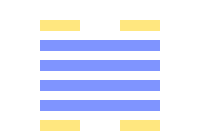
28.2.3.4.5 (28 > 2) - THE TÂ KWO HEXAGRAM.
- 2. The second line, undivided, shows a decayed willow producing shoots, or an old husband in possession of his young wife. There will be advantage in every way.
- 3. The third line, undivided, shows a beam that is weak. There will be evil.
- 4. The fourth line, undivided, shows a beam curving upwards. There will be good fortune. If (the subject of it) looks for other (help but that of line one), there will be cause for regret.
- 5. The fifth line, undivided, shows a decayed willow producing flowers, or an old wife in possession of her young husband. There will be occasion neither for blame nor for praise.
28.2.3.4.5 (28 > 2) - Going all out
One is going to do the best one can so that others are impressed.
Bing DeepL Google Yandex28.2.3.4.5 (28 > 2) - Going all out
One is going to do the best one can so that others are impressed.
Bing DeepL Google Yandex28.2.3.4.5 (28 > 2) - Tá kvoh, le grand excès
Tá kvoh : 1. Grand excès, défaut, manquement ; 2. Traverser, dépasser.
- 2.
- 3. Une poutre, un pilier trop faible (voir texte I) sont mauvais (ils ne peuvent supporter) (grand défaut).
- 4. Une colonne haute et forte est bonne ; toute autre est dangereuse (opposition à ce qui précède)
- 5. Un vieux saule produisant une fleur, une vieille femme épousant un homme encore jeune, quoique non blâmables, ne peuvent être loués. La fleur du vieux saule ne peut durer, l’époux d’une vieille femme peut s’en dégoûter. (Faits qui passent les règles ordinaires.)
28.2.3.4.5 (28 > 2) - Sortir le grand jeu
On va faire du mieux qu’on peut pour que les autres soient impressionnés.
Bing DeepL Google Yandex28.2.3.4.5 (28 > 2) - Lemondás
- 2. Ha valaki nehézségekbe ütközik, emelje fel a leggyengébbet is hogy megőrizhesse jövőjét.
- 3. Ápolja kapcsolatait.
- 4. Mások támogatják de még fel kell épülnie.
- 5. Igyekszik javítani mielőtt mások észrevennék a hanyatlást.
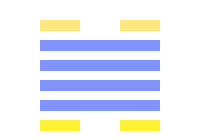
28.1.2.3.4.5 (28 > 24) - THE TÂ KWO HEXAGRAM.
- 1. The first line, divided, shows one placing mats of the white mâo grass under things set on the ground. There will be no error.
- 2. The second line, undivided, shows a decayed willow producing shoots, or an old husband in possession of his young wife. There will be advantage in every way.
- 3. The third line, undivided, shows a beam that is weak. There will be evil.
- 4. The fourth line, undivided, shows a beam curving upwards. There will be good fortune. If (the subject of it) looks for other (help but that of line one), there will be cause for regret.
- 5. The fifth line, undivided, shows a decayed willow producing flowers, or an old wife in possession of her young husband. There will be occasion neither for blame nor for praise.
28.1.2.3.4.5 (28 > 24) - Speaking without taboos
One is referring to practices that have become illegal.
Bing DeepL Google Yandex28.1.2.3.4.5 (28 > 24) - Speaking without taboos
One is referring to practices that have become illegal.
Bing DeepL Google Yandex28.1.2.3.4.5 (28 > 24) - Tá kvoh, le grand excès
Tá kvoh : 1. Grand excès, défaut, manquement ; 2. Traverser, dépasser.
-
1. Ceci est susceptible de deux explications : a. « S’appuyer sur des joncs » est un grand défaut ; ils plient et ne soutiennent pas. b. Pour placer un objet comme natte à offrande, se servir de mao blanc est fautif.
Note. Au lieu de gratter simplement la terre et l’aplanir.
(Le mao blanc représente la pureté, la droiture, kiet tche. Ceci d’après le commentaire représente un excès de précaution. Kwéh hu weï shin (1er sens). - 2.
- 3. Une poutre, un pilier trop faible (voir texte I) sont mauvais (ils ne peuvent supporter) (grand défaut).
- 4. Une colonne haute et forte est bonne ; toute autre est dangereuse (opposition à ce qui précède)
- 5. Un vieux saule produisant une fleur, une vieille femme épousant un homme encore jeune, quoique non blâmables, ne peuvent être loués. La fleur du vieux saule ne peut durer, l’époux d’une vieille femme peut s’en dégoûter. (Faits qui passent les règles ordinaires.)
28.1.2.3.4.5 (28 > 24) - Parler sans tabous
On se réfère à des pratiques devenues illicites.
Bing DeepL Google Yandex28.1.2.3.4.5 (28 > 24) - Lemondás
- 1. Fejlődni akar a gyengeség miatt.
- 2. Ha valaki nehézségekbe ütközik, emelje fel a leggyengébbet is hogy megőrizhesse jövőjét.
- 3. Ápolja kapcsolatait.
- 4. Mások támogatják de még fel kell épülnie.
- 5. Igyekszik javítani mielőtt mások észrevennék a hanyatlást.

28.6 (28 > 44) - THE TÂ KWO HEXAGRAM.
The topmost line, divided, shows its subject with extraordinary (boldness) wading through a stream, till the water hides the crown of his head. There will be evil, but no ground for blame.
Bing DeepL Google Yandex28.6 (28 > 44) - Losing one's bearings
One wants to continue alone because of the weakness of one's entourage.
Bing DeepL Google Yandex28.6 (28 > 44) - Losing one's bearings
One wants to continue alone because of the weakness of one's entourage.
Bing DeepL Google Yandex28.6 (28 > 44) - Tá kvoh, le grand excès
Tá kvoh : 1. Grand excès, défaut, manquement ; 2. Traverser, dépasser.
Traversant un fleuve, y entrer jusqu’au sommet de la tête est chose dangereuse, (mais peut n’être point blâmable, si on le fait pour aider quelqu’un, d’après le Com.) (3e sens). Force défaillante.
Bing DeepL Google Yandex28.6 (28 > 44) - Perdre ses repères
On veut continuer seul à cause de la faiblesse de son entourage.
Bing DeepL Google Yandex28.6 (28 > 44) - Lemondás
Egyedül akar haladni a környezők gyengesége miatt.
Bing DeepL Google Yandex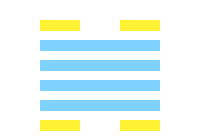
28.1.6 (28 > 1) - THE TÂ KWO HEXAGRAM.
- 1. The first line, divided, shows one placing mats of the white mâo grass under things set on the ground. There will be no error.
- 6. The topmost line, divided, shows its subject with extraordinary (boldness) wading through a stream, till the water hides the crown of his head. There will be evil, but no ground for blame.
28.1.6 (28 > 1) - Waiting for the right time
One gives up so one can return later.
Bing DeepL Google Yandex28.1.6 (28 > 1) - Waiting for the right time
One gives up so one can return later.
Bing DeepL Google Yandex28.1.6 (28 > 1) - Tá kvoh, le grand excès
Tá kvoh : 1. Grand excès, défaut, manquement ; 2. Traverser, dépasser.
-
1. Ceci est susceptible de deux explications : a. « S’appuyer sur des joncs » est un grand défaut ; ils plient et ne soutiennent pas. b. Pour placer un objet comme natte à offrande, se servir de mao blanc est fautif.
Note. Au lieu de gratter simplement la terre et l’aplanir.
(Le mao blanc représente la pureté, la droiture, kiet tche. Ceci d’après le commentaire représente un excès de précaution. Kwéh hu weï shin (1er sens). - 6. Traversant un fleuve, y entrer jusqu’au sommet de la tête est chose dangereuse, (mais peut n’être point blâmable, si on le fait pour aider quelqu’un, d’après le Com.) (3e sens). Force défaillante.
28.1.6 (28 > 1) - Attendre le bon moment
On abandonne pour pouvoir revenir plus tard.
Bing DeepL Google Yandex28.1.6 (28 > 1) - Lemondás
- 1. Fejlődni akar a gyengeség miatt.
- 6. Egyedül akar haladni a környezők gyengesége miatt.
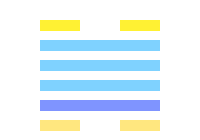
28.2.6 (28 > 33) - THE TÂ KWO HEXAGRAM.
- 2. The second line, undivided, shows a decayed willow producing shoots, or an old husband in possession of his young wife. There will be advantage in every way.
- 6. The topmost line, divided, shows its subject with extraordinary (boldness) wading through a stream, till the water hides the crown of his head. There will be evil, but no ground for blame.
28.2.6 (28 > 33) - Giving it another try
One encourages one's friends to do it again.
Bing DeepL Google Yandex28.2.6 (28 > 33) - Giving it another try
One encourages one's friends to do it again.
Bing DeepL Google Yandex28.2.6 (28 > 33) - Tá kvoh, le grand excès
Tá kvoh : 1. Grand excès, défaut, manquement ; 2. Traverser, dépasser.
- 2.
- 6. Traversant un fleuve, y entrer jusqu’au sommet de la tête est chose dangereuse, (mais peut n’être point blâmable, si on le fait pour aider quelqu’un, d’après le Com.) (3e sens). Force défaillante.
28.2.6 (28 > 33) - Faire un nouvel essai
On encourage ses amis à recommencer.
Bing DeepL Google Yandex28.2.6 (28 > 33) - Lemondás
- 2. Ha valaki nehézségekbe ütközik, emelje fel a leggyengébbet is hogy megőrizhesse jövőjét.
- 6. Egyedül akar haladni a környezők gyengesége miatt.
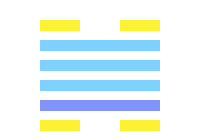
28.1.2.6 (28 > 13) - THE TÂ KWO HEXAGRAM.
- 1. The first line, divided, shows one placing mats of the white mâo grass under things set on the ground. There will be no error.
- 2. The second line, undivided, shows a decayed willow producing shoots, or an old husband in possession of his young wife. There will be advantage in every way.
- 6. The topmost line, divided, shows its subject with extraordinary (boldness) wading through a stream, till the water hides the crown of his head. There will be evil, but no ground for blame.
28.1.2.6 (28 > 13) - Knowing how to prepare delicious meals
One is showing the utmost ingenuity to get others out of retirement.
Bing DeepL Google Yandex28.1.2.6 (28 > 13) - Knowing how to prepare delicious meals
One is showing the utmost ingenuity to get others out of retirement.
Bing DeepL Google Yandex28.1.2.6 (28 > 13) - Tá kvoh, le grand excès
Tá kvoh : 1. Grand excès, défaut, manquement ; 2. Traverser, dépasser.
-
1. Ceci est susceptible de deux explications : a. « S’appuyer sur des joncs » est un grand défaut ; ils plient et ne soutiennent pas. b. Pour placer un objet comme natte à offrande, se servir de mao blanc est fautif.
Note. Au lieu de gratter simplement la terre et l’aplanir.
(Le mao blanc représente la pureté, la droiture, kiet tche. Ceci d’après le commentaire représente un excès de précaution. Kwéh hu weï shin (1er sens). - 2.
- 6. Traversant un fleuve, y entrer jusqu’au sommet de la tête est chose dangereuse, (mais peut n’être point blâmable, si on le fait pour aider quelqu’un, d’après le Com.) (3e sens). Force défaillante.
28.1.2.6 (28 > 13) - Savoir préparer de bons petits plats
On déploie des trésors d'ingéniosité pour faire sortir les autres de leur retraite.
Bing DeepL Google Yandex28.1.2.6 (28 > 13) - Lemondás
- 1. Fejlődni akar a gyengeség miatt.
- 2. Ha valaki nehézségekbe ütközik, emelje fel a leggyengébbet is hogy megőrizhesse jövőjét.
- 6. Egyedül akar haladni a környezők gyengesége miatt.
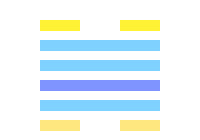
28.3.6 (28 > 6) - THE TÂ KWO HEXAGRAM.
- 3. The third line, undivided, shows a beam that is weak. There will be evil.
- 6. The topmost line, divided, shows its subject with extraordinary (boldness) wading through a stream, till the water hides the crown of his head. There will be evil, but no ground for blame.
28.3.6 (28 > 6) - Asking forgiveness
One faces one's responsibilities to go see those one has wronged.
Bing DeepL Google Yandex28.3.6 (28 > 6) - Asking forgiveness
One faces one's responsibilities to go see those one has wronged.
Bing DeepL Google Yandex28.3.6 (28 > 6) - Tá kvoh, le grand excès
Tá kvoh : 1. Grand excès, défaut, manquement ; 2. Traverser, dépasser.
- 3. Une poutre, un pilier trop faible (voir texte I) sont mauvais (ils ne peuvent supporter) (grand défaut).
- 6. Traversant un fleuve, y entrer jusqu’au sommet de la tête est chose dangereuse, (mais peut n’être point blâmable, si on le fait pour aider quelqu’un, d’après le Com.) (3e sens). Force défaillante.
28.3.6 (28 > 6) - Demander pardon
On fait face à ses responsabilités pour aller voir ceux à qui l'on a fait du tort.
Bing DeepL Google Yandex28.3.6 (28 > 6) - Lemondás
- 3. Ápolja kapcsolatait.
- 6. Egyedül akar haladni a környezők gyengesége miatt.
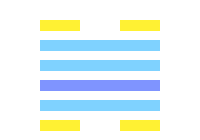
28.1.3.6 (28 > 10) - THE TÂ KWO HEXAGRAM.
- 1. The first line, divided, shows one placing mats of the white mâo grass under things set on the ground. There will be no error.
- 3. The third line, undivided, shows a beam that is weak. There will be evil.
- 6. The topmost line, divided, shows its subject with extraordinary (boldness) wading through a stream, till the water hides the crown of his head. There will be evil, but no ground for blame.
28.1.3.6 (28 > 10) - Rejecting inconsistent measurements
One leaves one's assistants to resume studying.
Bing DeepL Google Yandex28.1.3.6 (28 > 10) - Rejecting inconsistent measurements
One leaves one's assistants to resume studying.
Bing DeepL Google Yandex28.1.3.6 (28 > 10) - Tá kvoh, le grand excès
Tá kvoh : 1. Grand excès, défaut, manquement ; 2. Traverser, dépasser.
-
1. Ceci est susceptible de deux explications : a. « S’appuyer sur des joncs » est un grand défaut ; ils plient et ne soutiennent pas. b. Pour placer un objet comme natte à offrande, se servir de mao blanc est fautif.
Note. Au lieu de gratter simplement la terre et l’aplanir.
(Le mao blanc représente la pureté, la droiture, kiet tche. Ceci d’après le commentaire représente un excès de précaution. Kwéh hu weï shin (1er sens). - 3. Une poutre, un pilier trop faible (voir texte I) sont mauvais (ils ne peuvent supporter) (grand défaut).
- 6. Traversant un fleuve, y entrer jusqu’au sommet de la tête est chose dangereuse, (mais peut n’être point blâmable, si on le fait pour aider quelqu’un, d’après le Com.) (3e sens). Force défaillante.
28.1.3.6 (28 > 10) - Rejeter des mesures incohérentes
On quitte ses assistants pour reprendre ses études.
Bing DeepL Google Yandex28.1.3.6 (28 > 10) - Lemondás
- 1. Fejlődni akar a gyengeség miatt.
- 3. Ápolja kapcsolatait.
- 6. Egyedül akar haladni a környezők gyengesége miatt.
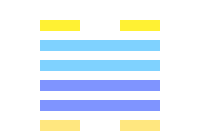
28.2.3.6 (28 > 12) - THE TÂ KWO HEXAGRAM.
- 2. The second line, undivided, shows a decayed willow producing shoots, or an old husband in possession of his young wife. There will be advantage in every way.
- 3. The third line, undivided, shows a beam that is weak. There will be evil.
- 6. The topmost line, divided, shows its subject with extraordinary (boldness) wading through a stream, till the water hides the crown of his head. There will be evil, but no ground for blame.
28.2.3.6 (28 > 12) - Eliminating mediators
One pays the price of an unfinished attempt.
Bing DeepL Google Yandex28.2.3.6 (28 > 12) - Eliminating mediators
One pays the price of an unfinished attempt.
Bing DeepL Google Yandex28.2.3.6 (28 > 12) - Tá kvoh, le grand excès
Tá kvoh : 1. Grand excès, défaut, manquement ; 2. Traverser, dépasser.
- 2.
- 3. Une poutre, un pilier trop faible (voir texte I) sont mauvais (ils ne peuvent supporter) (grand défaut).
- 6. Traversant un fleuve, y entrer jusqu’au sommet de la tête est chose dangereuse, (mais peut n’être point blâmable, si on le fait pour aider quelqu’un, d’après le Com.) (3e sens). Force défaillante.
28.2.3.6 (28 > 12) - Éliminer les médiateurs
On essuie les plâtres d'une tentative inachevée.
Bing DeepL Google Yandex28.2.3.6 (28 > 12) - Lemondás
- 2. Ha valaki nehézségekbe ütközik, emelje fel a leggyengébbet is hogy megőrizhesse jövőjét.
- 3. Ápolja kapcsolatait.
- 6. Egyedül akar haladni a környezők gyengesége miatt.
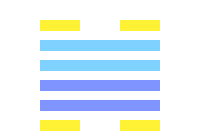
28.1.2.3.6 (28 > 25) - THE TÂ KWO HEXAGRAM.
- 1. The first line, divided, shows one placing mats of the white mâo grass under things set on the ground. There will be no error.
- 2. The second line, undivided, shows a decayed willow producing shoots, or an old husband in possession of his young wife. There will be advantage in every way.
- 3. The third line, undivided, shows a beam that is weak. There will be evil.
- 6. The topmost line, divided, shows its subject with extraordinary (boldness) wading through a stream, till the water hides the crown of his head. There will be evil, but no ground for blame.
28.1.2.3.6 (28 > 25) - Establishing a regulation
One participates with other competitors in the development of fair and equitable rules.
Bing DeepL Google Yandex28.1.2.3.6 (28 > 25) - Establishing a regulation
One participates with other competitors in the development of fair and equitable rules.
Bing DeepL Google Yandex28.1.2.3.6 (28 > 25) - Tá kvoh, le grand excès
Tá kvoh : 1. Grand excès, défaut, manquement ; 2. Traverser, dépasser.
-
1. Ceci est susceptible de deux explications : a. « S’appuyer sur des joncs » est un grand défaut ; ils plient et ne soutiennent pas. b. Pour placer un objet comme natte à offrande, se servir de mao blanc est fautif.
Note. Au lieu de gratter simplement la terre et l’aplanir.
(Le mao blanc représente la pureté, la droiture, kiet tche. Ceci d’après le commentaire représente un excès de précaution. Kwéh hu weï shin (1er sens). - 2.
- 3. Une poutre, un pilier trop faible (voir texte I) sont mauvais (ils ne peuvent supporter) (grand défaut).
- 6. Traversant un fleuve, y entrer jusqu’au sommet de la tête est chose dangereuse, (mais peut n’être point blâmable, si on le fait pour aider quelqu’un, d’après le Com.) (3e sens). Force défaillante.
28.1.2.3.6 (28 > 25) - Établir un règlement
On participe avec les autres concurrents à l'élaboration de règles justes et équitables.
Bing DeepL Google Yandex28.1.2.3.6 (28 > 25) - Lemondás
- 1. Fejlődni akar a gyengeség miatt.
- 2. Ha valaki nehézségekbe ütközik, emelje fel a leggyengébbet is hogy megőrizhesse jövőjét.
- 3. Ápolja kapcsolatait.
- 6. Egyedül akar haladni a környezők gyengesége miatt.
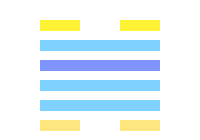
28.4.6 (28 > 57) - THE TÂ KWO HEXAGRAM.
- 4. The fourth line, undivided, shows a beam curving upwards. There will be good fortune. If (the subject of it) looks for other (help but that of line one), there will be cause for regret.
- 6. The topmost line, divided, shows its subject with extraordinary (boldness) wading through a stream, till the water hides the crown of his head. There will be evil, but no ground for blame.
28.4.6 (28 > 57) - Relying on other supports
One finds a solid reason to justify one's absences.
Bing DeepL Google Yandex28.4.6 (28 > 57) - Relying on other supports
One finds a solid reason to justify one's absences.
Bing DeepL Google Yandex28.4.6 (28 > 57) - Tá kvoh, le grand excès
Tá kvoh : 1. Grand excès, défaut, manquement ; 2. Traverser, dépasser.
- 4. Une colonne haute et forte est bonne ; toute autre est dangereuse (opposition à ce qui précède)
- 6. Traversant un fleuve, y entrer jusqu’au sommet de la tête est chose dangereuse, (mais peut n’être point blâmable, si on le fait pour aider quelqu’un, d’après le Com.) (3e sens). Force défaillante.
28.4.6 (28 > 57) - Compter sur d'autres soutiens
On trouve une raison solide pour justifier ses absences.
Bing DeepL Google Yandex28.4.6 (28 > 57) - Lemondás
- 4. Mások támogatják de még fel kell épülnie.
- 6. Egyedül akar haladni a környezők gyengesége miatt.
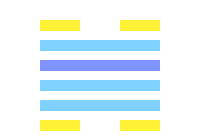
28.1.4.6 (28 > 9) - THE TÂ KWO HEXAGRAM.
- 1. The first line, divided, shows one placing mats of the white mâo grass under things set on the ground. There will be no error.
- 4. The fourth line, undivided, shows a beam curving upwards. There will be good fortune. If (the subject of it) looks for other (help but that of line one), there will be cause for regret.
- 6. The topmost line, divided, shows its subject with extraordinary (boldness) wading through a stream, till the water hides the crown of his head. There will be evil, but no ground for blame.
28.1.4.6 (28 > 9) - Being a pioneer
One is ahead of those who want more assistance.
Bing DeepL Google Yandex28.1.4.6 (28 > 9) - Being a pioneer
One is ahead of those who want more assistance.
Bing DeepL Google Yandex28.1.4.6 (28 > 9) - Tá kvoh, le grand excès
Tá kvoh : 1. Grand excès, défaut, manquement ; 2. Traverser, dépasser.
-
1. Ceci est susceptible de deux explications : a. « S’appuyer sur des joncs » est un grand défaut ; ils plient et ne soutiennent pas. b. Pour placer un objet comme natte à offrande, se servir de mao blanc est fautif.
Note. Au lieu de gratter simplement la terre et l’aplanir.
(Le mao blanc représente la pureté, la droiture, kiet tche. Ceci d’après le commentaire représente un excès de précaution. Kwéh hu weï shin (1er sens). - 4. Une colonne haute et forte est bonne ; toute autre est dangereuse (opposition à ce qui précède)
- 6. Traversant un fleuve, y entrer jusqu’au sommet de la tête est chose dangereuse, (mais peut n’être point blâmable, si on le fait pour aider quelqu’un, d’après le Com.) (3e sens). Force défaillante.
28.1.4.6 (28 > 9) - Être un pionnier
On devance ceux qui veulent avoir plus d'assistance.
Bing DeepL Google Yandex28.1.4.6 (28 > 9) - Lemondás
- 1. Fejlődni akar a gyengeség miatt.
- 4. Mások támogatják de még fel kell épülnie.
- 6. Egyedül akar haladni a környezők gyengesége miatt.
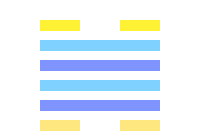
28.2.4.6 (28 > 53) - THE TÂ KWO HEXAGRAM.
- 2. The second line, undivided, shows a decayed willow producing shoots, or an old husband in possession of his young wife. There will be advantage in every way.
- 4. The fourth line, undivided, shows a beam curving upwards. There will be good fortune. If (the subject of it) looks for other (help but that of line one), there will be cause for regret.
- 6. The topmost line, divided, shows its subject with extraordinary (boldness) wading through a stream, till the water hides the crown of his head. There will be evil, but no ground for blame.
28.2.4.6 (28 > 53) - Throwing in the towel
One wants to let others know that one is cutting the losses.
Bing DeepL Google Yandex28.2.4.6 (28 > 53) - Throwing in the towel
One wants to let others know that one is cutting the losses.
Bing DeepL Google Yandex28.2.4.6 (28 > 53) - Tá kvoh, le grand excès
Tá kvoh : 1. Grand excès, défaut, manquement ; 2. Traverser, dépasser.
- 2.
- 4. Une colonne haute et forte est bonne ; toute autre est dangereuse (opposition à ce qui précède)
- 6. Traversant un fleuve, y entrer jusqu’au sommet de la tête est chose dangereuse, (mais peut n’être point blâmable, si on le fait pour aider quelqu’un, d’après le Com.) (3e sens). Force défaillante.
28.2.4.6 (28 > 53) - Jeter l'éponge
On tient à faire savoir aux autres que l'on arrête les frais.
Bing DeepL Google Yandex28.2.4.6 (28 > 53) - Lemondás
- 2. Ha valaki nehézségekbe ütközik, emelje fel a leggyengébbet is hogy megőrizhesse jövőjét.
- 4. Mások támogatják de még fel kell épülnie.
- 6. Egyedül akar haladni a környezők gyengesége miatt.
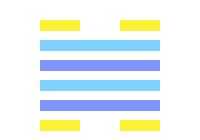
28.1.2.4.6 (28 > 37) - THE TÂ KWO HEXAGRAM.
- 1. The first line, divided, shows one placing mats of the white mâo grass under things set on the ground. There will be no error.
- 2. The second line, undivided, shows a decayed willow producing shoots, or an old husband in possession of his young wife. There will be advantage in every way.
- 4. The fourth line, undivided, shows a beam curving upwards. There will be good fortune. If (the subject of it) looks for other (help but that of line one), there will be cause for regret.
- 6. The topmost line, divided, shows its subject with extraordinary (boldness) wading through a stream, till the water hides the crown of his head. There will be evil, but no ground for blame.
28.1.2.4.6 (28 > 37) - Suffering for one's values
One would rather be hungry and cold than give in to dishonourable pressure.
Bing DeepL Google Yandex28.1.2.4.6 (28 > 37) - Suffering for one's values
One would rather be hungry and cold than give in to dishonorable pressure.
Bing DeepL Google Yandex28.1.2.4.6 (28 > 37) - Tá kvoh, le grand excès
Tá kvoh : 1. Grand excès, défaut, manquement ; 2. Traverser, dépasser.
-
1. Ceci est susceptible de deux explications : a. « S’appuyer sur des joncs » est un grand défaut ; ils plient et ne soutiennent pas. b. Pour placer un objet comme natte à offrande, se servir de mao blanc est fautif.
Note. Au lieu de gratter simplement la terre et l’aplanir.
(Le mao blanc représente la pureté, la droiture, kiet tche. Ceci d’après le commentaire représente un excès de précaution. Kwéh hu weï shin (1er sens). - 2.
- 4. Une colonne haute et forte est bonne ; toute autre est dangereuse (opposition à ce qui précède)
- 6. Traversant un fleuve, y entrer jusqu’au sommet de la tête est chose dangereuse, (mais peut n’être point blâmable, si on le fait pour aider quelqu’un, d’après le Com.) (3e sens). Force défaillante.
28.1.2.4.6 (28 > 37) - Souffrir pour ses valeurs
On préfère plutôt avoir faim et froid que de céder à des pressions indignes.
Bing DeepL Google Yandex28.1.2.4.6 (28 > 37) - Lemondás
- 1. Fejlődni akar a gyengeség miatt.
- 2. Ha valaki nehézségekbe ütközik, emelje fel a leggyengébbet is hogy megőrizhesse jövőjét.
- 4. Mások támogatják de még fel kell épülnie.
- 6. Egyedül akar haladni a környezők gyengesége miatt.
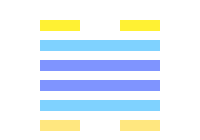
28.3.4.6 (28 > 59) - THE TÂ KWO HEXAGRAM.
- 3. The third line, undivided, shows a beam that is weak. There will be evil.
- 4. The fourth line, undivided, shows a beam curving upwards. There will be good fortune. If (the subject of it) looks for other (help but that of line one), there will be cause for regret.
- 6. The topmost line, divided, shows its subject with extraordinary (boldness) wading through a stream, till the water hides the crown of his head. There will be evil, but no ground for blame.
28.3.4.6 (28 > 59) - Burning bridges
One repaints one's home in red so that others will avoid it.
Bing DeepL Google Yandex28.3.4.6 (28 > 59) - Burning bridges
One repaints one's home in red so that others will avoid it.
Bing DeepL Google Yandex28.3.4.6 (28 > 59) - Tá kvoh, le grand excès
Tá kvoh : 1. Grand excès, défaut, manquement ; 2. Traverser, dépasser.
- 3. Une poutre, un pilier trop faible (voir texte I) sont mauvais (ils ne peuvent supporter) (grand défaut).
- 4. Une colonne haute et forte est bonne ; toute autre est dangereuse (opposition à ce qui précède)
- 6. Traversant un fleuve, y entrer jusqu’au sommet de la tête est chose dangereuse, (mais peut n’être point blâmable, si on le fait pour aider quelqu’un, d’après le Com.) (3e sens). Force défaillante.
28.3.4.6 (28 > 59) - Brûler les ponts
On repeint son habitation en rouge pour que les autres l'évitent.
Bing DeepL Google Yandex28.3.4.6 (28 > 59) - Lemondás
- 3. Ápolja kapcsolatait.
- 4. Mások támogatják de még fel kell épülnie.
- 6. Egyedül akar haladni a környezők gyengesége miatt.
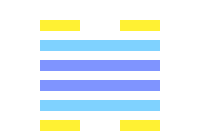
28.1.3.4.6 (28 > 61) - THE TÂ KWO HEXAGRAM.
- 1. The first line, divided, shows one placing mats of the white mâo grass under things set on the ground. There will be no error.
- 3. The third line, undivided, shows a beam that is weak. There will be evil.
- 4. The fourth line, undivided, shows a beam curving upwards. There will be good fortune. If (the subject of it) looks for other (help but that of line one), there will be cause for regret.
- 6. The topmost line, divided, shows its subject with extraordinary (boldness) wading through a stream, till the water hides the crown of his head. There will be evil, but no ground for blame.
28.1.3.4.6 (28 > 61) - Going against the flow
One wants to make progress but is prevented by headwinds.
Bing DeepL Google Yandex28.1.3.4.6 (28 > 61) - Going against the flow
One wants to make progress but is prevented by headwinds.
Bing DeepL Google Yandex28.1.3.4.6 (28 > 61) - Tá kvoh, le grand excès
Tá kvoh : 1. Grand excès, défaut, manquement ; 2. Traverser, dépasser.
-
1. Ceci est susceptible de deux explications : a. « S’appuyer sur des joncs » est un grand défaut ; ils plient et ne soutiennent pas. b. Pour placer un objet comme natte à offrande, se servir de mao blanc est fautif.
Note. Au lieu de gratter simplement la terre et l’aplanir.
(Le mao blanc représente la pureté, la droiture, kiet tche. Ceci d’après le commentaire représente un excès de précaution. Kwéh hu weï shin (1er sens). - 3. Une poutre, un pilier trop faible (voir texte I) sont mauvais (ils ne peuvent supporter) (grand défaut).
- 4. Une colonne haute et forte est bonne ; toute autre est dangereuse (opposition à ce qui précède)
- 6. Traversant un fleuve, y entrer jusqu’au sommet de la tête est chose dangereuse, (mais peut n’être point blâmable, si on le fait pour aider quelqu’un, d’après le Com.) (3e sens). Force défaillante.
28.1.3.4.6 (28 > 61) - Avancer à contre-courant
On veut faire des progrès mais on en est empêché par des vents contraires.
Bing DeepL Google Yandex28.1.3.4.6 (28 > 61) - Lemondás
- 1. Fejlődni akar a gyengeség miatt.
- 3. Ápolja kapcsolatait.
- 4. Mások támogatják de még fel kell épülnie.
- 6. Egyedül akar haladni a környezők gyengesége miatt.
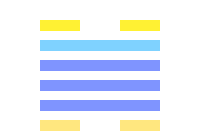
28.2.3.4.6 (28 > 20) - THE TÂ KWO HEXAGRAM.
- 2. The second line, undivided, shows a decayed willow producing shoots, or an old husband in possession of his young wife. There will be advantage in every way.
- 3. The third line, undivided, shows a beam that is weak. There will be evil.
- 4. The fourth line, undivided, shows a beam curving upwards. There will be good fortune. If (the subject of it) looks for other (help but that of line one), there will be cause for regret.
- 6. The topmost line, divided, shows its subject with extraordinary (boldness) wading through a stream, till the water hides the crown of his head. There will be evil, but no ground for blame.
28.2.3.4.6 (28 > 20) - Proving one's worth
One takes the lead over others by showing them one's efficiency.
Bing DeepL Google Yandex28.2.3.4.6 (28 > 20) - Proving one's worth
One takes the lead over others by showing them one's efficiency.
Bing DeepL Google Yandex28.2.3.4.6 (28 > 20) - Tá kvoh, le grand excès
Tá kvoh : 1. Grand excès, défaut, manquement ; 2. Traverser, dépasser.
- 2.
- 3. Une poutre, un pilier trop faible (voir texte I) sont mauvais (ils ne peuvent supporter) (grand défaut).
- 4. Une colonne haute et forte est bonne ; toute autre est dangereuse (opposition à ce qui précède)
- 6. Traversant un fleuve, y entrer jusqu’au sommet de la tête est chose dangereuse, (mais peut n’être point blâmable, si on le fait pour aider quelqu’un, d’après le Com.) (3e sens). Force défaillante.
28.2.3.4.6 (28 > 20) - Faire ses preuves
On prend l'ascendant sur les autres en leur montrant son efficacité.
Bing DeepL Google Yandex28.2.3.4.6 (28 > 20) - Lemondás
- 2. Ha valaki nehézségekbe ütközik, emelje fel a leggyengébbet is hogy megőrizhesse jövőjét.
- 3. Ápolja kapcsolatait.
- 4. Mások támogatják de még fel kell épülnie.
- 6. Egyedül akar haladni a környezők gyengesége miatt.
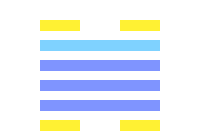
28.1.2.3.4.6 (28 > 42) - THE TÂ KWO HEXAGRAM.
- 1. The first line, divided, shows one placing mats of the white mâo grass under things set on the ground. There will be no error.
- 2. The second line, undivided, shows a decayed willow producing shoots, or an old husband in possession of his young wife. There will be advantage in every way.
- 3. The third line, undivided, shows a beam that is weak. There will be evil.
- 4. The fourth line, undivided, shows a beam curving upwards. There will be good fortune. If (the subject of it) looks for other (help but that of line one), there will be cause for regret.
- 6. The topmost line, divided, shows its subject with extraordinary (boldness) wading through a stream, till the water hides the crown of his head. There will be evil, but no ground for blame.
28.1.2.3.4.6 (28 > 42) - Dissociating
One criticises others to not seem to support them.
Bing DeepL Google Yandex28.1.2.3.4.6 (28 > 42) - Dissociating
One criticizes others to not seem to support them.
Bing DeepL Google Yandex28.1.2.3.4.6 (28 > 42) - Tá kvoh, le grand excès
Tá kvoh : 1. Grand excès, défaut, manquement ; 2. Traverser, dépasser.
-
1. Ceci est susceptible de deux explications : a. « S’appuyer sur des joncs » est un grand défaut ; ils plient et ne soutiennent pas. b. Pour placer un objet comme natte à offrande, se servir de mao blanc est fautif.
Note. Au lieu de gratter simplement la terre et l’aplanir.
(Le mao blanc représente la pureté, la droiture, kiet tche. Ceci d’après le commentaire représente un excès de précaution. Kwéh hu weï shin (1er sens). - 2.
- 3. Une poutre, un pilier trop faible (voir texte I) sont mauvais (ils ne peuvent supporter) (grand défaut).
- 4. Une colonne haute et forte est bonne ; toute autre est dangereuse (opposition à ce qui précède)
- 6. Traversant un fleuve, y entrer jusqu’au sommet de la tête est chose dangereuse, (mais peut n’être point blâmable, si on le fait pour aider quelqu’un, d’après le Com.) (3e sens). Force défaillante.
28.1.2.3.4.6 (28 > 42) - Se désolidariser
On critique les autres pour ne pas avoir l'air de les soutenir.
Bing DeepL Google Yandex28.1.2.3.4.6 (28 > 42) - Lemondás
- 1. Fejlődni akar a gyengeség miatt.
- 2. Ha valaki nehézségekbe ütközik, emelje fel a leggyengébbet is hogy megőrizhesse jövőjét.
- 3. Ápolja kapcsolatait.
- 4. Mások támogatják de még fel kell épülnie.
- 6. Egyedül akar haladni a környezők gyengesége miatt.
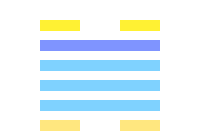
28.5.6 (28 > 50) - THE TÂ KWO HEXAGRAM.
- 5. The fifth line, undivided, shows a decayed willow producing flowers, or an old wife in possession of her young husband. There will be occasion neither for blame nor for praise.
- 6. The topmost line, divided, shows its subject with extraordinary (boldness) wading through a stream, till the water hides the crown of his head. There will be evil, but no ground for blame.
28.5.6 (28 > 50) - Responding to an emergency
One rushes things when one needs results immediately.
Bing DeepL Google Yandex28.5.6 (28 > 50) - Responding to an emergency
One rushes things when one needs results immediately.
Bing DeepL Google Yandex28.5.6 (28 > 50) - Tá kvoh, le grand excès
Tá kvoh : 1. Grand excès, défaut, manquement ; 2. Traverser, dépasser.
- 5. Un vieux saule produisant une fleur, une vieille femme épousant un homme encore jeune, quoique non blâmables, ne peuvent être loués. La fleur du vieux saule ne peut durer, l’époux d’une vieille femme peut s’en dégoûter. (Faits qui passent les règles ordinaires.)
- 6. Traversant un fleuve, y entrer jusqu’au sommet de la tête est chose dangereuse, (mais peut n’être point blâmable, si on le fait pour aider quelqu’un, d’après le Com.) (3e sens). Force défaillante.
28.5.6 (28 > 50) - Répondre à une urgence
On va très vite en besogne quand on a besoin de résultats immédiatement.
Bing DeepL Google Yandex28.5.6 (28 > 50) - Lemondás
- 5. Igyekszik javítani mielőtt mások észrevennék a hanyatlást.
- 6. Egyedül akar haladni a környezők gyengesége miatt.
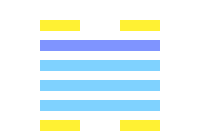
28.1.5.6 (28 > 14) - THE TÂ KWO HEXAGRAM.
- 1. The first line, divided, shows one placing mats of the white mâo grass under things set on the ground. There will be no error.
- 5. The fifth line, undivided, shows a decayed willow producing flowers, or an old wife in possession of her young husband. There will be occasion neither for blame nor for praise.
- 6. The topmost line, divided, shows its subject with extraordinary (boldness) wading through a stream, till the water hides the crown of his head. There will be evil, but no ground for blame.
28.1.5.6 (28 > 14) - Regretting afterwards
One has admitted one's faults despite the absence of those who would have liked to hear it.
Bing DeepL Google Yandex28.1.5.6 (28 > 14) - Regretting afterwards
One has admitted one's faults despite the absence of those who would have liked to hear it.
Bing DeepL Google Yandex28.1.5.6 (28 > 14) - Tá kvoh, le grand excès
Tá kvoh : 1. Grand excès, défaut, manquement ; 2. Traverser, dépasser.
-
1. Ceci est susceptible de deux explications : a. « S’appuyer sur des joncs » est un grand défaut ; ils plient et ne soutiennent pas. b. Pour placer un objet comme natte à offrande, se servir de mao blanc est fautif.
Note. Au lieu de gratter simplement la terre et l’aplanir.
(Le mao blanc représente la pureté, la droiture, kiet tche. Ceci d’après le commentaire représente un excès de précaution. Kwéh hu weï shin (1er sens). - 5. Un vieux saule produisant une fleur, une vieille femme épousant un homme encore jeune, quoique non blâmables, ne peuvent être loués. La fleur du vieux saule ne peut durer, l’époux d’une vieille femme peut s’en dégoûter. (Faits qui passent les règles ordinaires.)
- 6. Traversant un fleuve, y entrer jusqu’au sommet de la tête est chose dangereuse, (mais peut n’être point blâmable, si on le fait pour aider quelqu’un, d’après le Com.) (3e sens). Force défaillante.
28.1.5.6 (28 > 14) - Regretter après-coup
On a reconnu ses fautes en dépit de l'absence de ceux qui auraient voulu l'entendre.
Bing DeepL Google Yandex28.1.5.6 (28 > 14) - Lemondás
- 1. Fejlődni akar a gyengeség miatt.
- 5. Igyekszik javítani mielőtt mások észrevennék a hanyatlást.
- 6. Egyedül akar haladni a környezők gyengesége miatt.
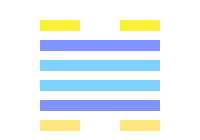
28.2.5.6 (28 > 56) - THE TÂ KWO HEXAGRAM.
- 2. The second line, undivided, shows a decayed willow producing shoots, or an old husband in possession of his young wife. There will be advantage in every way.
- 5. The fifth line, undivided, shows a decayed willow producing flowers, or an old wife in possession of her young husband. There will be occasion neither for blame nor for praise.
- 6. The topmost line, divided, shows its subject with extraordinary (boldness) wading through a stream, till the water hides the crown of his head. There will be evil, but no ground for blame.
28.2.5.6 (28 > 56) - Calling to order
One huffs and puffs by wanting too much to tell others what they have to do.
Bing DeepL Google Yandex28.2.5.6 (28 > 56) - Calling to order
One huffs and puffs by wanting too much to tell others what they have to do.
Bing DeepL Google Yandex28.2.5.6 (28 > 56) - Tá kvoh, le grand excès
Tá kvoh : 1. Grand excès, défaut, manquement ; 2. Traverser, dépasser.
- 2.
- 5. Un vieux saule produisant une fleur, une vieille femme épousant un homme encore jeune, quoique non blâmables, ne peuvent être loués. La fleur du vieux saule ne peut durer, l’époux d’une vieille femme peut s’en dégoûter. (Faits qui passent les règles ordinaires.)
- 6. Traversant un fleuve, y entrer jusqu’au sommet de la tête est chose dangereuse, (mais peut n’être point blâmable, si on le fait pour aider quelqu’un, d’après le Com.) (3e sens). Force défaillante.
28.2.5.6 (28 > 56) - Rappeler à l'ordre
On s'époumone à force de vouloir dire aux autres ce qu'ils doivent faire.
Bing DeepL Google Yandex28.2.5.6 (28 > 56) - Lemondás
- 2. Ha valaki nehézségekbe ütközik, emelje fel a leggyengébbet is hogy megőrizhesse jövőjét.
- 5. Igyekszik javítani mielőtt mások észrevennék a hanyatlást.
- 6. Egyedül akar haladni a környezők gyengesége miatt.
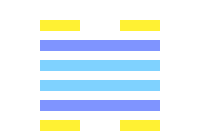
28.1.2.5.6 (28 > 30) - THE TÂ KWO HEXAGRAM.
- 1. The first line, divided, shows one placing mats of the white mâo grass under things set on the ground. There will be no error.
- 2. The second line, undivided, shows a decayed willow producing shoots, or an old husband in possession of his young wife. There will be advantage in every way.
- 5. The fifth line, undivided, shows a decayed willow producing flowers, or an old wife in possession of her young husband. There will be occasion neither for blame nor for praise.
- 6. The topmost line, divided, shows its subject with extraordinary (boldness) wading through a stream, till the water hides the crown of his head. There will be evil, but no ground for blame.
28.1.2.5.6 (28 > 30) - Dismantling the resistance
One triumphs over all one's opponents by striking a fatal blow to their projects.
Bing DeepL Google Yandex28.1.2.5.6 (28 > 30) - Dismantling the resistance
One triumphs over all one's opponents by striking a fatal blow to their projects.
Bing DeepL Google Yandex28.1.2.5.6 (28 > 30) - Tá kvoh, le grand excès
Tá kvoh : 1. Grand excès, défaut, manquement ; 2. Traverser, dépasser.
-
1. Ceci est susceptible de deux explications : a. « S’appuyer sur des joncs » est un grand défaut ; ils plient et ne soutiennent pas. b. Pour placer un objet comme natte à offrande, se servir de mao blanc est fautif.
Note. Au lieu de gratter simplement la terre et l’aplanir.
(Le mao blanc représente la pureté, la droiture, kiet tche. Ceci d’après le commentaire représente un excès de précaution. Kwéh hu weï shin (1er sens). - 2.
- 5. Un vieux saule produisant une fleur, une vieille femme épousant un homme encore jeune, quoique non blâmables, ne peuvent être loués. La fleur du vieux saule ne peut durer, l’époux d’une vieille femme peut s’en dégoûter. (Faits qui passent les règles ordinaires.)
- 6. Traversant un fleuve, y entrer jusqu’au sommet de la tête est chose dangereuse, (mais peut n’être point blâmable, si on le fait pour aider quelqu’un, d’après le Com.) (3e sens). Force défaillante.
28.1.2.5.6 (28 > 30) - Démanteler la résistance
On triomphe de tous ses opposants en portant un coup fatal à leurs projets.
Bing DeepL Google Yandex28.1.2.5.6 (28 > 30) - Lemondás
- 1. Fejlődni akar a gyengeség miatt.
- 2. Ha valaki nehézségekbe ütközik, emelje fel a leggyengébbet is hogy megőrizhesse jövőjét.
- 5. Igyekszik javítani mielőtt mások észrevennék a hanyatlást.
- 6. Egyedül akar haladni a környezők gyengesége miatt.
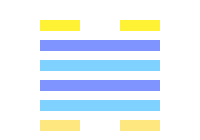
28.3.5.6 (28 > 64) - THE TÂ KWO HEXAGRAM.
- 3. The third line, undivided, shows a beam that is weak. There will be evil.
- 5. The fifth line, undivided, shows a decayed willow producing flowers, or an old wife in possession of her young husband. There will be occasion neither for blame nor for praise.
- 6. The topmost line, divided, shows its subject with extraordinary (boldness) wading through a stream, till the water hides the crown of his head. There will be evil, but no ground for blame.
28.3.5.6 (28 > 64) - Becoming unbearable
One always finds something to criticise when others are not friends.
Bing DeepL Google Yandex28.3.5.6 (28 > 64) - Becoming unbearable
One always finds something to criticize when others are not friends.
Bing DeepL Google Yandex28.3.5.6 (28 > 64) - Tá kvoh, le grand excès
Tá kvoh : 1. Grand excès, défaut, manquement ; 2. Traverser, dépasser.
- 3. Une poutre, un pilier trop faible (voir texte I) sont mauvais (ils ne peuvent supporter) (grand défaut).
- 5. Un vieux saule produisant une fleur, une vieille femme épousant un homme encore jeune, quoique non blâmables, ne peuvent être loués. La fleur du vieux saule ne peut durer, l’époux d’une vieille femme peut s’en dégoûter. (Faits qui passent les règles ordinaires.)
- 6. Traversant un fleuve, y entrer jusqu’au sommet de la tête est chose dangereuse, (mais peut n’être point blâmable, si on le fait pour aider quelqu’un, d’après le Com.) (3e sens). Force défaillante.
28.3.5.6 (28 > 64) - Devenir insupportable
On trouve toujours quelque chose à critiquer quand les autres ne sont pas des amis.
Bing DeepL Google Yandex28.3.5.6 (28 > 64) - Lemondás
- 3. Ápolja kapcsolatait.
- 5. Igyekszik javítani mielőtt mások észrevennék a hanyatlást.
- 6. Egyedül akar haladni a környezők gyengesége miatt.
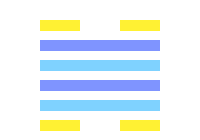
28.1.3.5.6 (28 > 38) - THE TÂ KWO HEXAGRAM.
- 1. The first line, divided, shows one placing mats of the white mâo grass under things set on the ground. There will be no error.
- 3. The third line, undivided, shows a beam that is weak. There will be evil.
- 5. The fifth line, undivided, shows a decayed willow producing flowers, or an old wife in possession of her young husband. There will be occasion neither for blame nor for praise.
- 6. The topmost line, divided, shows its subject with extraordinary (boldness) wading through a stream, till the water hides the crown of his head. There will be evil, but no ground for blame.
28.1.3.5.6 (28 > 38) - Wanting the happiness of one' s family
One wishes to have more power to surround one's relatives with benefits.
Bing DeepL Google Yandex28.1.3.5.6 (28 > 38) - Wanting the happiness of one' s family
One wishes to have more power to surround one's relatives with benefits.
Bing DeepL Google Yandex28.1.3.5.6 (28 > 38) - Tá kvoh, le grand excès
Tá kvoh : 1. Grand excès, défaut, manquement ; 2. Traverser, dépasser.
-
1. Ceci est susceptible de deux explications : a. « S’appuyer sur des joncs » est un grand défaut ; ils plient et ne soutiennent pas. b. Pour placer un objet comme natte à offrande, se servir de mao blanc est fautif.
Note. Au lieu de gratter simplement la terre et l’aplanir.
(Le mao blanc représente la pureté, la droiture, kiet tche. Ceci d’après le commentaire représente un excès de précaution. Kwéh hu weï shin (1er sens). - 3. Une poutre, un pilier trop faible (voir texte I) sont mauvais (ils ne peuvent supporter) (grand défaut).
- 5. Un vieux saule produisant une fleur, une vieille femme épousant un homme encore jeune, quoique non blâmables, ne peuvent être loués. La fleur du vieux saule ne peut durer, l’époux d’une vieille femme peut s’en dégoûter. (Faits qui passent les règles ordinaires.)
- 6. Traversant un fleuve, y entrer jusqu’au sommet de la tête est chose dangereuse, (mais peut n’être point blâmable, si on le fait pour aider quelqu’un, d’après le Com.) (3e sens). Force défaillante.
28.1.3.5.6 (28 > 38) - Vouloir le bonheur des siens
On souhaite avoir davantage de pouvoir pour entourer ses proches de bienfaits.
Bing DeepL Google Yandex28.1.3.5.6 (28 > 38) - Lemondás
- 1. Fejlődni akar a gyengeség miatt.
- 3. Ápolja kapcsolatait.
- 5. Igyekszik javítani mielőtt mások észrevennék a hanyatlást.
- 6. Egyedül akar haladni a környezők gyengesége miatt.
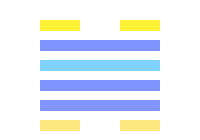
28.2.3.5.6 (28 > 35) - THE TÂ KWO HEXAGRAM.
- 2. The second line, undivided, shows a decayed willow producing shoots, or an old husband in possession of his young wife. There will be advantage in every way.
- 3. The third line, undivided, shows a beam that is weak. There will be evil.
- 5. The fifth line, undivided, shows a decayed willow producing flowers, or an old wife in possession of her young husband. There will be occasion neither for blame nor for praise.
- 6. The topmost line, divided, shows its subject with extraordinary (boldness) wading through a stream, till the water hides the crown of his head. There will be evil, but no ground for blame.
28.2.3.5.6 (28 > 35) - Being blunt
One fiddles confidently with very fragile objects.
Bing DeepL Google Yandex28.2.3.5.6 (28 > 35) - Being blunt
One fiddles confidently with very fragile objects.
Bing DeepL Google Yandex28.2.3.5.6 (28 > 35) - Tá kvoh, le grand excès
Tá kvoh : 1. Grand excès, défaut, manquement ; 2. Traverser, dépasser.
- 2.
- 3. Une poutre, un pilier trop faible (voir texte I) sont mauvais (ils ne peuvent supporter) (grand défaut).
- 5. Un vieux saule produisant une fleur, une vieille femme épousant un homme encore jeune, quoique non blâmables, ne peuvent être loués. La fleur du vieux saule ne peut durer, l’époux d’une vieille femme peut s’en dégoûter. (Faits qui passent les règles ordinaires.)
- 6. Traversant un fleuve, y entrer jusqu’au sommet de la tête est chose dangereuse, (mais peut n’être point blâmable, si on le fait pour aider quelqu’un, d’après le Com.) (3e sens). Force défaillante.
28.2.3.5.6 (28 > 35) - Ne pas prendre de pincettes
On tripote avec assurance des objets très fragiles.
Bing DeepL Google Yandex28.2.3.5.6 (28 > 35) - Lemondás
- 2. Ha valaki nehézségekbe ütközik, emelje fel a leggyengébbet is hogy megőrizhesse jövőjét.
- 3. Ápolja kapcsolatait.
- 5. Igyekszik javítani mielőtt mások észrevennék a hanyatlást.
- 6. Egyedül akar haladni a környezők gyengesége miatt.
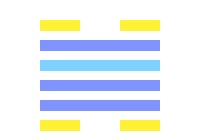
28.1.2.3.5.6 (28 > 21) - THE TÂ KWO HEXAGRAM.
- 1. The first line, divided, shows one placing mats of the white mâo grass under things set on the ground. There will be no error.
- 2. The second line, undivided, shows a decayed willow producing shoots, or an old husband in possession of his young wife. There will be advantage in every way.
- 3. The third line, undivided, shows a beam that is weak. There will be evil.
- 5. The fifth line, undivided, shows a decayed willow producing flowers, or an old wife in possession of her young husband. There will be occasion neither for blame nor for praise.
- 6. The topmost line, divided, shows its subject with extraordinary (boldness) wading through a stream, till the water hides the crown of his head. There will be evil, but no ground for blame.
28.1.2.3.5.6 (28 > 21) - Seeking asylum
One finds refuge among those who have been able to win the most seasoned.
Bing DeepL Google Yandex28.1.2.3.5.6 (28 > 21) - Seeking asylum
One finds refuge among those who have been able to win the most seasoned.
Bing DeepL Google Yandex28.1.2.3.5.6 (28 > 21) - Tá kvoh, le grand excès
Tá kvoh : 1. Grand excès, défaut, manquement ; 2. Traverser, dépasser.
-
1. Ceci est susceptible de deux explications : a. « S’appuyer sur des joncs » est un grand défaut ; ils plient et ne soutiennent pas. b. Pour placer un objet comme natte à offrande, se servir de mao blanc est fautif.
Note. Au lieu de gratter simplement la terre et l’aplanir.
(Le mao blanc représente la pureté, la droiture, kiet tche. Ceci d’après le commentaire représente un excès de précaution. Kwéh hu weï shin (1er sens). - 2.
- 3. Une poutre, un pilier trop faible (voir texte I) sont mauvais (ils ne peuvent supporter) (grand défaut).
- 5. Un vieux saule produisant une fleur, une vieille femme épousant un homme encore jeune, quoique non blâmables, ne peuvent être loués. La fleur du vieux saule ne peut durer, l’époux d’une vieille femme peut s’en dégoûter. (Faits qui passent les règles ordinaires.)
- 6. Traversant un fleuve, y entrer jusqu’au sommet de la tête est chose dangereuse, (mais peut n’être point blâmable, si on le fait pour aider quelqu’un, d’après le Com.) (3e sens). Force défaillante.
28.1.2.3.5.6 (28 > 21) - Faire une demande d'asile
On trouve refuge auprès de ceux qui ont pu vaincre les plus aguerris.
Bing DeepL Google Yandex28.1.2.3.5.6 (28 > 21) - Lemondás
- 1. Fejlődni akar a gyengeség miatt.
- 2. Ha valaki nehézségekbe ütközik, emelje fel a leggyengébbet is hogy megőrizhesse jövőjét.
- 3. Ápolja kapcsolatait.
- 5. Igyekszik javítani mielőtt mások észrevennék a hanyatlást.
- 6. Egyedül akar haladni a környezők gyengesége miatt.
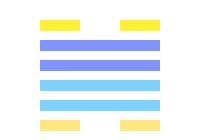
28.4.5.6 (28 > 18) - THE TÂ KWO HEXAGRAM.
- 4. The fourth line, undivided, shows a beam curving upwards. There will be good fortune. If (the subject of it) looks for other (help but that of line one), there will be cause for regret.
- 5. The fifth line, undivided, shows a decayed willow producing flowers, or an old wife in possession of her young husband. There will be occasion neither for blame nor for praise.
- 6. The topmost line, divided, shows its subject with extraordinary (boldness) wading through a stream, till the water hides the crown of his head. There will be evil, but no ground for blame.
28.4.5.6 (28 > 18) - Signing a discharge
One steps back to let the most competent take the matter in hand.
Bing DeepL Google Yandex28.4.5.6 (28 > 18) - Signing a discharge
One steps back to let the most competent take the matter in hand.
Bing DeepL Google Yandex28.4.5.6 (28 > 18) - Tá kvoh, le grand excès
Tá kvoh : 1. Grand excès, défaut, manquement ; 2. Traverser, dépasser.
- 4. Une colonne haute et forte est bonne ; toute autre est dangereuse (opposition à ce qui précède)
- 5. Un vieux saule produisant une fleur, une vieille femme épousant un homme encore jeune, quoique non blâmables, ne peuvent être loués. La fleur du vieux saule ne peut durer, l’époux d’une vieille femme peut s’en dégoûter. (Faits qui passent les règles ordinaires.)
- 6. Traversant un fleuve, y entrer jusqu’au sommet de la tête est chose dangereuse, (mais peut n’être point blâmable, si on le fait pour aider quelqu’un, d’après le Com.) (3e sens). Force défaillante.
28.4.5.6 (28 > 18) - Signer une décharge
On recule pour laisser les plus compétents prendre les choses en main.
Bing DeepL Google Yandex28.4.5.6 (28 > 18) - Lemondás
- 4. Mások támogatják de még fel kell épülnie.
- 5. Igyekszik javítani mielőtt mások észrevennék a hanyatlást.
- 6. Egyedül akar haladni a környezők gyengesége miatt.
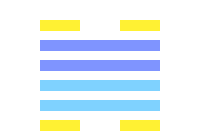
28.1.4.5.6 (28 > 26) - THE TÂ KWO HEXAGRAM.
- 1. The first line, divided, shows one placing mats of the white mâo grass under things set on the ground. There will be no error.
- 4. The fourth line, undivided, shows a beam curving upwards. There will be good fortune. If (the subject of it) looks for other (help but that of line one), there will be cause for regret.
- 5. The fifth line, undivided, shows a decayed willow producing flowers, or an old wife in possession of her young husband. There will be occasion neither for blame nor for praise.
- 6. The topmost line, divided, shows its subject with extraordinary (boldness) wading through a stream, till the water hides the crown of his head. There will be evil, but no ground for blame.
28.1.4.5.6 (28 > 26) - Becoming an expert
One studies minutely a work that others have created.
Bing DeepL Google Yandex28.1.4.5.6 (28 > 26) - Becoming an expert
One studies minutely a work that others have created.
Bing DeepL Google Yandex28.1.4.5.6 (28 > 26) - Tá kvoh, le grand excès
Tá kvoh : 1. Grand excès, défaut, manquement ; 2. Traverser, dépasser.
-
1. Ceci est susceptible de deux explications : a. « S’appuyer sur des joncs » est un grand défaut ; ils plient et ne soutiennent pas. b. Pour placer un objet comme natte à offrande, se servir de mao blanc est fautif.
Note. Au lieu de gratter simplement la terre et l’aplanir.
(Le mao blanc représente la pureté, la droiture, kiet tche. Ceci d’après le commentaire représente un excès de précaution. Kwéh hu weï shin (1er sens). - 4. Une colonne haute et forte est bonne ; toute autre est dangereuse (opposition à ce qui précède)
- 5. Un vieux saule produisant une fleur, une vieille femme épousant un homme encore jeune, quoique non blâmables, ne peuvent être loués. La fleur du vieux saule ne peut durer, l’époux d’une vieille femme peut s’en dégoûter. (Faits qui passent les règles ordinaires.)
- 6. Traversant un fleuve, y entrer jusqu’au sommet de la tête est chose dangereuse, (mais peut n’être point blâmable, si on le fait pour aider quelqu’un, d’après le Com.) (3e sens). Force défaillante.
28.1.4.5.6 (28 > 26) - Devenir un expert
On étudie dans ses moindres détails une œuvre que les autres ont réalisée.
Bing DeepL Google Yandex28.1.4.5.6 (28 > 26) - Lemondás
- 1. Fejlődni akar a gyengeség miatt.
- 4. Mások támogatják de még fel kell épülnie.
- 5. Igyekszik javítani mielőtt mások észrevennék a hanyatlást.
- 6. Egyedül akar haladni a környezők gyengesége miatt.
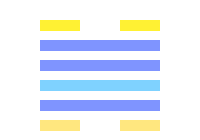
28.2.4.5.6 (28 > 52) - THE TÂ KWO HEXAGRAM.
- 2. The second line, undivided, shows a decayed willow producing shoots, or an old husband in possession of his young wife. There will be advantage in every way.
- 4. The fourth line, undivided, shows a beam curving upwards. There will be good fortune. If (the subject of it) looks for other (help but that of line one), there will be cause for regret.
- 5. The fifth line, undivided, shows a decayed willow producing flowers, or an old wife in possession of her young husband. There will be occasion neither for blame nor for praise.
- 6. The topmost line, divided, shows its subject with extraordinary (boldness) wading through a stream, till the water hides the crown of his head. There will be evil, but no ground for blame.
28.2.4.5.6 (28 > 52) - Lending consumables
One borrows an object without any guarantee of being able to return it intact.
Bing DeepL Google Yandex28.2.4.5.6 (28 > 52) - Lending consumables
One borrows an object without any guarantee of being able to return it intact.
Bing DeepL Google Yandex28.2.4.5.6 (28 > 52) - Tá kvoh, le grand excès
Tá kvoh : 1. Grand excès, défaut, manquement ; 2. Traverser, dépasser.
- 2.
- 4. Une colonne haute et forte est bonne ; toute autre est dangereuse (opposition à ce qui précède)
- 5. Un vieux saule produisant une fleur, une vieille femme épousant un homme encore jeune, quoique non blâmables, ne peuvent être loués. La fleur du vieux saule ne peut durer, l’époux d’une vieille femme peut s’en dégoûter. (Faits qui passent les règles ordinaires.)
- 6. Traversant un fleuve, y entrer jusqu’au sommet de la tête est chose dangereuse, (mais peut n’être point blâmable, si on le fait pour aider quelqu’un, d’après le Com.) (3e sens). Force défaillante.
28.2.4.5.6 (28 > 52) - Prêter des consommables
On emprunte un objet sans garantie de pouvoir le rendre intact.
Bing DeepL Google Yandex28.2.4.5.6 (28 > 52) - Lemondás
- 2. Ha valaki nehézségekbe ütközik, emelje fel a leggyengébbet is hogy megőrizhesse jövőjét.
- 4. Mások támogatják de még fel kell épülnie.
- 5. Igyekszik javítani mielőtt mások észrevennék a hanyatlást.
- 6. Egyedül akar haladni a környezők gyengesége miatt.
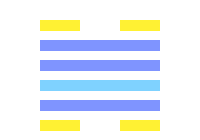
28.1.2.4.5.6 (28 > 22) - THE TÂ KWO HEXAGRAM.
- 1. The first line, divided, shows one placing mats of the white mâo grass under things set on the ground. There will be no error.
- 2. The second line, undivided, shows a decayed willow producing shoots, or an old husband in possession of his young wife. There will be advantage in every way.
- 4. The fourth line, undivided, shows a beam curving upwards. There will be good fortune. If (the subject of it) looks for other (help but that of line one), there will be cause for regret.
- 5. The fifth line, undivided, shows a decayed willow producing flowers, or an old wife in possession of her young husband. There will be occasion neither for blame nor for praise.
- 6. The topmost line, divided, shows its subject with extraordinary (boldness) wading through a stream, till the water hides the crown of his head. There will be evil, but no ground for blame.
28.1.2.4.5.6 (28 > 22) - Bringing a smile back
One comforts the losers by giving them a portion of one's earnings.
Bing DeepL Google Yandex28.1.2.4.5.6 (28 > 22) - Bringing a smile back
One comforts the losers by giving them a portion of one's earnings.
Bing DeepL Google Yandex28.1.2.4.5.6 (28 > 22) - Tá kvoh, le grand excès
Tá kvoh : 1. Grand excès, défaut, manquement ; 2. Traverser, dépasser.
-
1. Ceci est susceptible de deux explications : a. « S’appuyer sur des joncs » est un grand défaut ; ils plient et ne soutiennent pas. b. Pour placer un objet comme natte à offrande, se servir de mao blanc est fautif.
Note. Au lieu de gratter simplement la terre et l’aplanir.
(Le mao blanc représente la pureté, la droiture, kiet tche. Ceci d’après le commentaire représente un excès de précaution. Kwéh hu weï shin (1er sens). - 2.
- 4. Une colonne haute et forte est bonne ; toute autre est dangereuse (opposition à ce qui précède)
- 5. Un vieux saule produisant une fleur, une vieille femme épousant un homme encore jeune, quoique non blâmables, ne peuvent être loués. La fleur du vieux saule ne peut durer, l’époux d’une vieille femme peut s’en dégoûter. (Faits qui passent les règles ordinaires.)
- 6. Traversant un fleuve, y entrer jusqu’au sommet de la tête est chose dangereuse, (mais peut n’être point blâmable, si on le fait pour aider quelqu’un, d’après le Com.) (3e sens). Force défaillante.
28.1.2.4.5.6 (28 > 22) - Rendre le sourire
On réconforte les perdants en leur donnant une partie de ses gains.
Bing DeepL Google Yandex28.1.2.4.5.6 (28 > 22) - Lemondás
- 1. Fejlődni akar a gyengeség miatt.
- 2. Ha valaki nehézségekbe ütközik, emelje fel a leggyengébbet is hogy megőrizhesse jövőjét.
- 4. Mások támogatják de még fel kell épülnie.
- 5. Igyekszik javítani mielőtt mások észrevennék a hanyatlást.
- 6. Egyedül akar haladni a környezők gyengesége miatt.

28.3.4.5.6 (28 > 4) - THE TÂ KWO HEXAGRAM.
- 3. The third line, undivided, shows a beam that is weak. There will be evil.
- 4. The fourth line, undivided, shows a beam curving upwards. There will be good fortune. If (the subject of it) looks for other (help but that of line one), there will be cause for regret.
- 5. The fifth line, undivided, shows a decayed willow producing flowers, or an old wife in possession of her young husband. There will be occasion neither for blame nor for praise.
- 6. The topmost line, divided, shows its subject with extraordinary (boldness) wading through a stream, till the water hides the crown of his head. There will be evil, but no ground for blame.
28.3.4.5.6 (28 > 4) - Admitting that one cannot succeed without help
One knows that others have painful things to confess.
Bing DeepL Google Yandex28.3.4.5.6 (28 > 4) - Admitting that one cannot succeed without help
One knows that others have painful things to confess.
Bing DeepL Google Yandex28.3.4.5.6 (28 > 4) - Tá kvoh, le grand excès
Tá kvoh : 1. Grand excès, défaut, manquement ; 2. Traverser, dépasser.
- 3. Une poutre, un pilier trop faible (voir texte I) sont mauvais (ils ne peuvent supporter) (grand défaut).
- 4. Une colonne haute et forte est bonne ; toute autre est dangereuse (opposition à ce qui précède)
- 5. Un vieux saule produisant une fleur, une vieille femme épousant un homme encore jeune, quoique non blâmables, ne peuvent être loués. La fleur du vieux saule ne peut durer, l’époux d’une vieille femme peut s’en dégoûter. (Faits qui passent les règles ordinaires.)
- 6. Traversant un fleuve, y entrer jusqu’au sommet de la tête est chose dangereuse, (mais peut n’être point blâmable, si on le fait pour aider quelqu’un, d’après le Com.) (3e sens). Force défaillante.
28.3.4.5.6 (28 > 4) - Admettre qu'on ne peut pas réussir sans aide
On sait que les autres ont des choses pénibles à avouer.
Bing DeepL Google Yandex28.3.4.5.6 (28 > 4) - Lemondás
- 3. Ápolja kapcsolatait.
- 4. Mások támogatják de még fel kell épülnie.
- 5. Igyekszik javítani mielőtt mások észrevennék a hanyatlást.
- 6. Egyedül akar haladni a környezők gyengesége miatt.
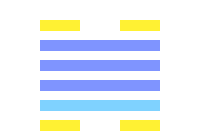
28.1.3.4.5.6 (28 > 41) - THE TÂ KWO HEXAGRAM.
- 1. The first line, divided, shows one placing mats of the white mâo grass under things set on the ground. There will be no error.
- 3. The third line, undivided, shows a beam that is weak. There will be evil.
- 4. The fourth line, undivided, shows a beam curving upwards. There will be good fortune. If (the subject of it) looks for other (help but that of line one), there will be cause for regret.
- 5. The fifth line, undivided, shows a decayed willow producing flowers, or an old wife in possession of her young husband. There will be occasion neither for blame nor for praise.
- 6. The topmost line, divided, shows its subject with extraordinary (boldness) wading through a stream, till the water hides the crown of his head. There will be evil, but no ground for blame.
28.1.3.4.5.6 (28 > 41) - Losing one's essence
One studies carefully the causes of one's decline.
Bing DeepL Google Yandex28.1.3.4.5.6 (28 > 41) - Losing one's essence
One studies carefully the causes of one's decline.
Bing DeepL Google Yandex28.1.3.4.5.6 (28 > 41) - Tá kvoh, le grand excès
Tá kvoh : 1. Grand excès, défaut, manquement ; 2. Traverser, dépasser.
-
1. Ceci est susceptible de deux explications : a. « S’appuyer sur des joncs » est un grand défaut ; ils plient et ne soutiennent pas. b. Pour placer un objet comme natte à offrande, se servir de mao blanc est fautif.
Note. Au lieu de gratter simplement la terre et l’aplanir.
(Le mao blanc représente la pureté, la droiture, kiet tche. Ceci d’après le commentaire représente un excès de précaution. Kwéh hu weï shin (1er sens). - 3. Une poutre, un pilier trop faible (voir texte I) sont mauvais (ils ne peuvent supporter) (grand défaut).
- 4. Une colonne haute et forte est bonne ; toute autre est dangereuse (opposition à ce qui précède)
- 5. Un vieux saule produisant une fleur, une vieille femme épousant un homme encore jeune, quoique non blâmables, ne peuvent être loués. La fleur du vieux saule ne peut durer, l’époux d’une vieille femme peut s’en dégoûter. (Faits qui passent les règles ordinaires.)
- 6. Traversant un fleuve, y entrer jusqu’au sommet de la tête est chose dangereuse, (mais peut n’être point blâmable, si on le fait pour aider quelqu’un, d’après le Com.) (3e sens). Force défaillante.
28.1.3.4.5.6 (28 > 41) - Perdre son essence
On étudie avec attention les causes de sa déchéance.
Bing DeepL Google Yandex28.1.3.4.5.6 (28 > 41) - Lemondás
- 1. Fejlődni akar a gyengeség miatt.
- 3. Ápolja kapcsolatait.
- 4. Mások támogatják de még fel kell épülnie.
- 5. Igyekszik javítani mielőtt mások észrevennék a hanyatlást.
- 6. Egyedül akar haladni a környezők gyengesége miatt.
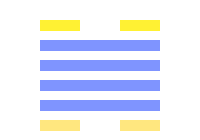
28.2.3.4.5.6 (28 > 23) - THE TÂ KWO HEXAGRAM.
- 2. The second line, undivided, shows a decayed willow producing shoots, or an old husband in possession of his young wife. There will be advantage in every way.
- 3. The third line, undivided, shows a beam that is weak. There will be evil.
- 4. The fourth line, undivided, shows a beam curving upwards. There will be good fortune. If (the subject of it) looks for other (help but that of line one), there will be cause for regret.
- 5. The fifth line, undivided, shows a decayed willow producing flowers, or an old wife in possession of her young husband. There will be occasion neither for blame nor for praise.
- 6. The topmost line, divided, shows its subject with extraordinary (boldness) wading through a stream, till the water hides the crown of his head. There will be evil, but no ground for blame.
28.2.3.4.5.6 (28 > 23) - Stealing one's reputation
One is taking credit for something that belongs to someone else.
Bing DeepL Google Yandex28.2.3.4.5.6 (28 > 23) - Stealing one's reputation
One is taking credit for something that belongs to someone else.
Bing DeepL Google Yandex28.2.3.4.5.6 (28 > 23) - Tá kvoh, le grand excès
Tá kvoh : 1. Grand excès, défaut, manquement ; 2. Traverser, dépasser.
- 2.
- 3. Une poutre, un pilier trop faible (voir texte I) sont mauvais (ils ne peuvent supporter) (grand défaut).
- 4. Une colonne haute et forte est bonne ; toute autre est dangereuse (opposition à ce qui précède)
- 5. Un vieux saule produisant une fleur, une vieille femme épousant un homme encore jeune, quoique non blâmables, ne peuvent être loués. La fleur du vieux saule ne peut durer, l’époux d’une vieille femme peut s’en dégoûter. (Faits qui passent les règles ordinaires.)
- 6. Traversant un fleuve, y entrer jusqu’au sommet de la tête est chose dangereuse, (mais peut n’être point blâmable, si on le fait pour aider quelqu’un, d’après le Com.) (3e sens). Force défaillante.
28.2.3.4.5.6 (28 > 23) - Voler sa réputation
On usurpe un mérite qui revient à quelqu'un d'autre.
Bing DeepL Google Yandex28.2.3.4.5.6 (28 > 23) - Lemondás
- 2. Ha valaki nehézségekbe ütközik, emelje fel a leggyengébbet is hogy megőrizhesse jövőjét.
- 3. Ápolja kapcsolatait.
- 4. Mások támogatják de még fel kell épülnie.
- 5. Igyekszik javítani mielőtt mások észrevennék a hanyatlást.
- 6. Egyedül akar haladni a környezők gyengesége miatt.
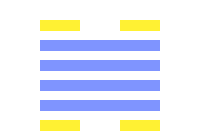
28.1.2.3.4.5.6 (28 > 27) - THE TÂ KWO HEXAGRAM.
- 1. The first line, divided, shows one placing mats of the white mâo grass under things set on the ground. There will be no error.
- 2. The second line, undivided, shows a decayed willow producing shoots, or an old husband in possession of his young wife. There will be advantage in every way.
- 3. The third line, undivided, shows a beam that is weak. There will be evil.
- 4. The fourth line, undivided, shows a beam curving upwards. There will be good fortune. If (the subject of it) looks for other (help but that of line one), there will be cause for regret.
- 5. The fifth line, undivided, shows a decayed willow producing flowers, or an old wife in possession of her young husband. There will be occasion neither for blame nor for praise.
- 6. The topmost line, divided, shows its subject with extraordinary (boldness) wading through a stream, till the water hides the crown of his head. There will be evil, but no ground for blame.
28.1.2.3.4.5.6 (28 > 27) - Offering a wide variety
One completes one's creation with touches of different colors.
Bing DeepL Google Yandex28.1.2.3.4.5.6 (28 > 27) - Offering a wide variety
One completes one's creation with touches of different colors.
Bing DeepL Google Yandex28.1.2.3.4.5.6 (28 > 27) - Tá kvoh, le grand excès
Tá kvoh : 1. Grand excès, défaut, manquement ; 2. Traverser, dépasser.
-
1. Ceci est susceptible de deux explications : a. « S’appuyer sur des joncs » est un grand défaut ; ils plient et ne soutiennent pas. b. Pour placer un objet comme natte à offrande, se servir de mao blanc est fautif.
Note. Au lieu de gratter simplement la terre et l’aplanir.
(Le mao blanc représente la pureté, la droiture, kiet tche. Ceci d’après le commentaire représente un excès de précaution. Kwéh hu weï shin (1er sens). - 2.
- 3. Une poutre, un pilier trop faible (voir texte I) sont mauvais (ils ne peuvent supporter) (grand défaut).
- 4. Une colonne haute et forte est bonne ; toute autre est dangereuse (opposition à ce qui précède)
- 5. Un vieux saule produisant une fleur, une vieille femme épousant un homme encore jeune, quoique non blâmables, ne peuvent être loués. La fleur du vieux saule ne peut durer, l’époux d’une vieille femme peut s’en dégoûter. (Faits qui passent les règles ordinaires.)
- 6. Traversant un fleuve, y entrer jusqu’au sommet de la tête est chose dangereuse, (mais peut n’être point blâmable, si on le fait pour aider quelqu’un, d’après le Com.) (3e sens). Force défaillante.
28.1.2.3.4.5.6 (28 > 27) - Décliner une gamme
On parachève sa création par des touches de différentes couleurs.
Bing DeepL Google Yandex28.1.2.3.4.5.6 (28 > 27) - Lemondás
- 1. Fejlődni akar a gyengeség miatt.
- 2. Ha valaki nehézségekbe ütközik, emelje fel a leggyengébbet is hogy megőrizhesse jövőjét.
- 3. Ápolja kapcsolatait.
- 4. Mások támogatják de még fel kell épülnie.
- 5. Igyekszik javítani mielőtt mások észrevennék a hanyatlást.
- 6. Egyedül akar haladni a környezők gyengesége miatt.

